#this discourse is like one side saying read a book or wikipedia and the other side thinking they are being burned at the stake
Text
You know, the conversation about sea shanties is just another chapter in what seems like the endless story of people of color, in particular black and indigenous people, telling us to learn the history of the things we like and white people hearing that it means we have to lock those things away forever and burn our books and stamp on our records. As if that isn’t what white people have done to black and indigenous stories, to black and indigenous cultures, to black and indigenous arts, wealth, etc for centuries. As if that is what the people of color who are educating us on the things we like are actually advocating for. News flash: part of the history of oppressors is fearing the tables turning, when that is never been the goal of civil rights and social justice movements. Ever.
So fun fact: I grew up loving good ol’ classic rock n’ roll. My first concert was the Allman Brothers Band, which is one of the most interesting rock bands of all time imo. I really love a good southern twangy jam, the way the guitars sing, the bluesy sunny vibe. Ramblin’ Man? Jessica? Simple Man? Carry On Wayward Son? Hotel California? Perfect fucking driving music if you ask me.
If you know anything about southern rock, you know the iconography - the Confederate Flag is everywhere, in the crowds, for many bands it’s in the album covers and the photoshoots, etc. You know what you get when you wade in the Southern rock water*.
The lyrics from Lynyrd Skynyrd’s Sweet Home Alabama have been parsed and interpreted in all kinds of ways -
In Birmingham they love the governor (boo-boo-boo)
Now we all did what we could do
Now Watergate does not bother me
Does your conscience bother you?
And yeah, you could read this as ironic or satirical. In fact, that’s what guitarist and co-writer Gary Rossington says according to NPR -
"A lot of people believed in segregation and all that. We didn't. We put the 'boo, boo, boo' there saying, 'We don't like Wallace,' " Rossington said. But he also added that there were "a lot of different interpretations. I'm sure if you asked the other guys who are not with us anymore and are up in rock and roll heaven, they have their story of how it came about."
And yeah, maybe they didn’t like George Wallace or Nixon. Sure. Whatever. I could buy it, actually. Because this song actually is indicative of how many privileged people feel when they perceive being called out, even if the criticism isn’t about them. Call it wjhat you want - white fragility, white liberal sensitivity, etc. This song was written in response to Neil Young’s Southern Man, which goes:
Southern man, better keep your head
Don't forget what your good book said
Southern change gonna come at last
Now your crosses are burning fast
Southern man I saw cotton and I saw black
Tall white mansions and little shacks
Southern man, when will you pay them back?
I heard screamin' and bullwhips cracking
How long? How long? How?
Yeah, writer Ronnie Van Zant was so bothered by Neil Young talking about l*nchings, abject sl*very and reparations in Southern Man, a song that isn’t even about them or Alabama in particular, that he wrote Sweet Home Alabama.
Well I heard Mister Young sing about her
Well I heard ol' Neil put her down
Well I hope Neil Young will remember
A southern man don't need him around anyhow
Sweet home Alabama
Where the skies are so blue
Sweet home Alabama
Lord I'm comin' home to you
So ironically, even though Neil Young was just talking to racists in the US South, someone who ostensibly didn’t agree with segregation took that song as a personal attack because he liked “southern culture” and his home state of Alabama, despite its flaws.
But Young never says that the South is irredeemable. He just says white southerners need to come to terms with their history (and yes make reparations). In fact, according to NPR he has some issues with his lyrics. “I didn't like my words when I wrote them. They are accusatory and condescending.” I don’t agree. It needs to be said.
So Van Zant and the Skynyrd guys heard a criticism of white Southern racism and at BEST thought, “well that’s an unfair portrayal of me, a southern white man.” Van Zant can’t answer this question for himself since he died in a plane crash with two other band members and their manager in 1977.
In my opinion, knowing how white people can be when confronted with the reality of racism, this feels a lot like every other time a well-meaning white person (myself included) has said, “but not all white people.”
Not all Southern whites supported segregation at the time, but most did - and all white people benefit from the legacy of sl*very. I might not be a descendant of people who enslaved others, my ancestors might have come here as refugees, but after they fled Ireland for New York, they threw black people under the bus for whiteness.
Rock is a genre that owes everything to Black musicians - to blues and spirituals and gospel and yes, Black work songs. Black history is in the DNA of rock music. That I grew up thinking it was white music is mortifying to be honest.
But I don’t really like Sweet Home Alabama and I never have. It’s kind of just meh to me. Not a big loss.
And that takes me to the Allman Brothers Band. As far as I am aware, ABB (through many, many iterations - this is another band plagued by tragedy) has never been cool with racism. According to Vulture:
The Allmans respected not just black art but black players; as kids, Gregg and Duane got lessons from an older black guitarist their mother once refused to allow into her home, and later, they caught hell having Jaimoe and bassist Lamar Williams in their ranks in their adopted home state of Georgia. “If a musician could play, we didn’t look at his skin color,” Gregg wrote in his 2012 memoir My Cross to Bear.
“Nobody around here had seen guys who looked like them,” soul food legend and friend of the band Mama Louise Hudson said in Alan Paul’s 2014 oral history One Way Out: The Inside History of the Allman Brothers Band. “A lot of the white folk around here did not approve of them long-haired boys, or of them always having a black guy with them.” Southern rock occupied a peculiar axis of Mason-Dixon pride and reverence to blues and soul veterans who were hampered and harangued by the politics of the South. Gregg always pushed back. He didn’t placate audiences’ blind patriotism and racism the way Charlie Daniels and Hank Williams Jr. have. Last year, he spoke out against North Carolina’s transphobic “bathroom bill,” and when asked about the confederate flag in 2015, he told Radio.com, “If people are gonna look at that flag and think of it as representing slavery, then I say burn every one of them.”
And that is great.
But.
Whipping Post. Written by white ally Gregg Allman, bluesy and wild and passionate on a level that is hard to imagine, this is... one of the greatest songs I have ever heard. And it also makes me wonder if it’s maybe belittling a part of slavery.
My friends tell me, that I've been such a fool
But I had to stand by and take it baby, all for lovin' you
I drown myself in sorrow as I look at what you've done
But nothing seemed to change, the bad times stayed the same,
And I can't run
Sometimes I feel, sometimes I feel
Like I been tied to the whippin' post
Tied to the whippin' post, tied to the whippin' post
Good Lord, I feel like I'm dyin'.
Honestly? I don’t know. I’ve researched it, I’ve used google. There isn’t a lot the internet has to say about this song that isn’t “this song fucking slaps man!!!” Maybe part of it is the larger context - Allman was staunchly against racism and was taught by a Black guitarist and played with Black musicians and loved Black music. A white man comparing an emotionally abusive relationship with being whipped might feel different without that context.
(Whipping posts being used for people besides enslaved Black people does not mean Allman wasn’t referencing what Black American slaves experienced, so don’t even go there. I know. The Romans also had slaves. It’s different.)
But if some people of color on the internet critique this song someday, the appropriate response is not to act as if “hey here is where this comes from, please be mindful about historical context and get educated” means “never listen to that devil song again,” folks.
It’s about learning our histories so we can do better in the future. Not canceling entire genres of music. Some things are best left in the past but mostly it’s just about understanding what the things we love mean. And these things are more than their aesthetics.
*I also really, really love African American work songs. Always have.
#cait uses her musical knowledge for once#work songs#sea shanties#this discourse is like one side saying read a book or wikipedia and the other side thinking they are being burned at the stake#history#southern rock#music#racism#colonialism#slavery tw#lynching tw#neil young was right he shouldn't have back tracked#but he's also canadian so like fix your glass house honey
23 notes
·
View notes
Note
Hi! I hope you are doing okay with all the discourse going around. Im white and raised in a very white society so i will never have a say in it, but i was wondering, is there any way i can educate myself more in asian/chinese culture? Im aware i consume content thru western lens and because of that i dont really get all the nuances of the shows, but i would like to have at least some backround. Im guessing just watching the shows doesnt give enough of that, can you maybe reccommend some blogs or books to check out? (If you dont thats totally fine and im sorry if i said anything offensive)
Hey friend! Not offensive at all, no worries. Honestly, I’m not too sure. I think just keeping an open mind about things is a really good start. I’m not really sure which blogs to recommend but if I could recommend some dramas? Since it’s probably easier to watch a show then read a book?
《The Story of Minglan》 is a good one to sort of parse out the intricacy of historical Chinese society in the Song Dynasty, keeping in mind that different dynasties have different practices, so even amongst different time periods there were differences. 《The Story of Yanxi Palace》 is another good one for Qing Dynasty (circa 1740s) if you wanna get into imperial harem stuff. (Or you can watch 《甄嬛传》 or 《如懿传》 for harem stuff. I just think The Story of Yanxi Palace is the most palatable, most aesthetic, and most fun out of the three. The other two are kinda tragic?) There are other dramas but I feel they’re not as... accessible?
Chinese historical dramas come in 3 flavours: serious dramas, idol dramas, and those that ride the fence. What I mean by idol drama is...everyone in it is young and hot and the writing is eh and the acting is eh. More often then not there’s a lot of modern elements to it. The Untamed is so popular because it’s idol drama done really well. (xianxia and wuxia genre used to be more quality when I was a kid, but now they’re kind of ehhhh.) I would say Minglan and Yanxi are both successful because they ride the fence.
On the other hand, serious historical drama has A LOT of politics and can be quite dry especially if you’re watching it through half-assed subtitles. The actors typically are more seasoned, older. People jokingly say that idol drama is what mom watches and serious drama is what dad watches, and honestly given my parents’ tv habits...it’s pretty accurate 😂.
Some really well known ones from the past 20 years are:
The 《铁齿铜牙纪晓岚》 series 1-4. I would only recommend part 1-2, 3-4 are not as great. This one has quite a bit of humour but it might fly over your head a bit because of the language barrier. The story surrounds a well known government official and scholar named Ji Xiaolan 纪晓岚, his frenemy and colleague the (EXTREMELY corrupt) prime minister He Shen, and the Emperor Qianlong. For better or worse these three are depicted as both liege and subjects as well as friends. Trying to see Ji Xiaolan and He Shen one up each other while Qianlong tries to balance his court and rule the country is quite interesting. I won’t pretend this is an easy series to follow, but it’s actually quite fun.
《汉武大帝》 - is about Hanwu Emperor of the Han Dynasty circa 150 BC? He’s one of the most famous emperors of distant history. It’s basically about the course of his life and the many people that featured in it.
《大明王朝 》- my memories of this one is very vague, but it is about the Ming Dynasty (the dynasty before the Qing Dynasty c. 1500,1600.)
《The Advisors Alliance 军事联盟》- 2017 two-part television series based on the life of Sima Yi, a government official and military general who lived in the late Eastern Han dynasty and Three Kingdoms period of China. circa 150 AD.
As a side note, a lot of serious dramas for a while now have been focused on the Qing Dynasty, just because it’s the last imperial dynasty before Imperial China fell into decline, WWI and WWII ravaged the country and communism happened. Even a lot of idol drama are about the Qing Dynasty (I feel like I should do a post about this, just to string things together haha).
So for the Qing Dynasty, because they are Manchurian, their last name is Aisin Gioro or in Chinese Aixin Jueluo 爱新觉罗. Their earlier emperors are much more well known than their later ones and have been the focus of MANY dramas. (You’ll notice their names in the beginning spell very different than the Chinese names you’re used to, but once they take over China, the emperors’ names start to become more and more mainland Chinese and less and less Manchurian.)
Nu’er Hachi 努尔哈赤/ Nurhaci - The granddaddy of Qing Dynasty, but was never officially Emperor of China during his life time.
Huang Taiji 皇太极 - Nurhaci’s oldest son. He led the campaign against the Ming Dynasty but died before the campaign was over
Fulin 福林, Emperor Shunzhi 顺治 - Huang Taiji’s 9th son. He is the real first Emperor of the Qing Dynasty. His uncle Duo’Ergun 多尔衮/ Dorgon was his regent as well as his commander-in-chief. Dorgon was the one who won the war against the Ming Dynasty and instated his nephew as the Emperor. Fulin was 6 years old when this happened, and now you may wonder why the fuck is that? It’s because Fulin’s mother, Huang Taijii’s widowed concubine Consort Zhuang (name: pu’erji-jite bumubutai (pinyin) 博爾濟吉特 布木布泰/ Bumbutai Borjigit, Da-Yu’er 大玉儿) remarried her brother-in-law Dorgon. Whether Bumbutai and Dorgon were actually in love is....contestable. Certainly one of my favourite serious dramas that depict this part of history is《大青风云》.
Xuanye 玄燁, Emperor Kangxi 康熙 - Fulin’s third son. Very famous. Very long reign. Serious drama associated 《康熙微服私访记》, 《康熙王朝》
Yinzhen 胤禛, Emperor Yongzheng 雍正 - Xuanye's 4th son. His reign was highly contested because some ppl believed he forged the succession document. It’s probably not true. He was an efficient emperor but very austere, very severe. Not well liked. The best serious drama about him is probably 《雍正王朝》and the aforementioned《甄嬛传》. The former is 100% politics and a fictional re-telling of historical events whereas the latter is 100% harem drama and 100% made up. 《步步惊心》is an idol drama about a girl who transmigrated back to this time and fell in love with Yinzhen. Lol.
Hongli 弘历, Emperor Qianlong 乾隆 - Yinzhen’s 4th son. I think he’s the longest living/reigning emperor of Chinese history. SOOOOO many dramas were made about him or set in his reign. Of the serious drama category: 《铁齿铜牙纪晓岚》 that I mentioned earlier is really good. There are others but I won’t name them here. 《如懿传》 is a serious drama about his harem, but really terrible? I really didn’t like it (just my personal view). Incidentally it was released around the same time as《The Story of Yanxi Palace 延禧攻略》which is also about his harem and MUCH better in my opinion, because the actor for Hongli in Yanxi is much better skills-wise. 《还珠格格》was the OG idol drama about Hongli’s children. I gave a brief synopsis about it here. It was made in the 90s but damn...so nostalgic.
There’s many more emperors after him, but they’re not as important.
Okay yeah, so I’m not sure if any of this is really helpful, but definitely watching serious drama gives you much better context and understanding of Chinese culture than idol drama. I mean when the drama has flying and magic...the historical relevance sort of falls to the side. 🤣
ADDENDUM: I made a typo earlier. Fulin is Huang Taiji’s 9th son, not Nurhaci’s son. Also Abahai is Huang Taijii’s mother’s name (wikipedia lied to me on this one XD).
124 notes
·
View notes
Note
I watched the Green Knight too, and I actually found it too dark and disturbing. I didn’t really expect that having read and wrote research papers on the source material. I also found that the trailer did not accurately represent the movie, and after watching it i then rewatched the trailer and still…. They were two whole separate vibes. I also struggled with his mother’s motivation, especially since he really was beheaded at the end. What was the point on sending her son out on a quest just to kill him? I understand that she (through the fox) tried to turn him from that path, but she still created the path he took and it’s end. Also my fiancé (who had never read the origin work) was often confused because nothing was really explained. And I had read him the Wikipedia plot summary of the original text, so he would have some context because I knew there would be major differences, but even that didn’t help. Especially because Morgana’s motivation was just never explained. I mean other than inferring as a pagan witch she resented Christianity, and so ruined the Christian festivities, what was the motivation for the Green Knight’s challenge? It never explained that she resented her brother and his wife. And as far as wanting to prove his knights are not truly honorable, why would she want to use her son for that point? And only from reading the book do you really know that the old blind women at the castle is her, and in the movie, did she possess the lord and the lady and initiate the physical intimacies ? It’s just never explained. So I do agree with you in that the themes and messages were just too ambiguous, plus I found the actual plot to scattered as well. I also (just a personal nitpick) couldnt stand that after he was robbed, they left valuable stuff behind!!! I mean peasants would need (they’d kill for!!!) such a fine and sturdy cloak. And if the male bandit had a hankering to be a knight, why did he break the shield and leave the sword behind? And then Gawain, who was just attacked and left for dead!!! ALSO left the sword behind!!!! And set out again with no means to protect himself. I know, a minor complaint, but it really did just drive me wild because it made no sense at all. Anyways, sorry for the rant!
Thank you for sending all of this!
I agree and disagree about the vibe of the trailer--I think there was evidence that the movie would be a darker take on the story, because there were a lot of gory shots and it was kind of cut like a horror trailer. But I got the impression that it'd be a more... commercial adaptation than it ended up being? But the story is of course super cerebral and metaphorical (as opposed to straightforward and linear) when you actually watch it. I've heard mixed things on the horror aspects so you're not alone. Some people say it was too much, I kind of wish there was a little more 🤪 because I feel like the Green Knight's intro scene didn't really match the rest of the movie.
After I saw it, I advised a friend to read the original poem before watching, and she said it helped her but not by much. That's just not a good sign imo. Like I understand that they're trying to capture the strangeness of the text and the discourse around it and challenge our expectations of a story in general but eh it didn't totally land for me. I completely agree about Morgana. I feel like she and most characters' motives were very unclear, which gave it almost a nihilistic feeling. It's like they're trying to say "things happen just because, and that's the inescapable inevitability of life!!!" when that's simply not the case and not any more significant or interesting than characters having motivations/goals. I for one think Gawain would've been way more interesting if I got a stronger feeling that he was a supreme dick ON PURPOSE instead of vaguely wondering "do they expect me to be on his side or not???" the whole time.
12 notes
·
View notes
Note
ok sorry but how many people do yall think rog has ever slept with cos i’m guessing four figures no lie
okay, i don’t normally respond to messages like this because, frankly, i dont really feel like its my place to speculate on roger’s sex life. Theres a difference between writing a fiction story with a character named after and inspired by him and discussing his actual personal life which i have no real knowledge about. What he gets up to in his free time is between him and the women he does it with. but i didn’t really feel able to ignore this one. please don’t take this as me telling you off or shutting you down or anything like that. If you want to speculate about roger’s body count thats up to you, go nuts with it. and i love when you guys message me and I don’t want to discourage you from feeling like you can talk to me or just send me your random thoughts or whatever about any subject. But I feel like I need to address why I disagree with this sentiment. Also so I can ask ya’ll to please stop asking me questions like this.
So firstly, just to get this out of the way. 1000 is a lot. even 100 is a lot. I think if rog had slept with 1000+ people he’d have a least a few illegitimate kids and probably would have been checked into rehab for sex addiction (not to mention STIs and such because lbr people in the 70s specifically probs werent the most careful especially if drugs were involved). I mean even if we were going to say Rog got lucky with a different woman after every show we wouldn’t reach 1000. According to google, Queen played around 700 shows in their entire career. If we add shows played by The Cross thats only another 67 odd shows (according to wikipedia).
now, i think there are 3 things that contribute to this idea of roger as especially promiscuous. 1. His attitude/demeanour/general way he sells himself. 2. the generally held conceptions about rock stars and rock star behaviour. and 3. what i’m going to call fandom dumbassery (but i mean that with a lot of love)
So lets start with the man himself. Roger Taylor is loud and opinionated and not particularly humble. He knows he’s talented and attractive though for at least some time he was a little self-conscious about how feminine he looked. He’s always up for a laugh, likes to party and has admitted to enjoying his drink and his women. He’s had kids with two different women, who’s relationships “overlapped”, and is currently married to a third. At least that’s the perception we can gleam from his interviews, behind the scenes videos, and other public appearances.
It’s easy to see how that image leads to accusations of being a womaniser and a cheater and basically a bit of a slut lmao. But here’s the thing. I think Roger, in part, markets himself that way. The thing is, if you look at his solo songs and the relationships he currently has with his kids and their mothers, and things other people have said about him/his relationships over the years, I think it’s fair to say he also has a bit of a romantic streak maybe? idk if thats the best way of describing it...he’s self confessed to not being a fan of marriage and the like but he’s not opposed to writing and singing love songs and seems to believe in ~love~ as a concept/power. He certainly cares deeply for those closest to him. Whether or not that translates to an agreement with monogamy I can’t say for certain. It’s hard to draw conclusions here because a lot of what we know of his personal life was fed to us through magazines and news paper gossip column articles and they were never looking for the truth, they were looking for scandal and sensationalism.
For instance the whole thing with the overlapping relationships. I think most people who have read anything about roger and dom and debbie realise that it’s not as cut and dry as “he was cheating with debbie and left dom for her” even though that was the story being sold by the press at the time. The reality (or at least the version closer to reality since obviously no one outside of them and whoever they were closest with knows all the nitty gritty details) is that rog and dom had already split when they got married. it was a marriage of convenience to make sure her and the kids would be looked after financially etc even after he’d moved out. So while it looked to the public like he married one chick and 30 odd days later was spotted with another, there really wasn’t anything untoward happening. I’m not saying he never had casual hookups or one night stands and i’m not saying he never cheated, but I do think some of it’s been exaggerated, whether by him to encourage the rock star perception or by newspaper/magazine articles.
Now, obviously, we have stories of rog, particularly in the late 60s and into the 70s, being with multiple women. There’s that bit in the Interview with a Queen “Groupie” (which is a fantastic read and i defs recommend checking it out if you havent already) where she talks about roger being a chick magnet and says that, at the time, it was pretty common to sleep about. But, she also says she didnt notice him doing it more or less than anyone else and seemed to mostly be with Jo (his girlfriend at the time). This is the same Jo that got a mention in the Queen in 3D book (”i think we all had the feeling that these two were together for life, but it was not to be”). Conversely, we have that quote (which i cannot find rn but i’ll link it when i do) about roger sometimes having one girl upstairs while another waited in the garage for them to be finished. I think it was about Rog in the mid-late 60s in Truro but whatever. Obviously he wasn’t anywhere near celibate and it’s likely was sleeping with people outside of his relationship(s). But one has to assume that as he got older those kinds of antics stopped happening, at least as frequently.
There is one potential story that I remember reading somewhere along the way about Roger cheating on Debbie while she was pregnant. But, take that with a grain of salt because I can’t find the article again and also I think it was from like The Sun or something equally as rubbish. The press was notoriously always printing mean shit about the boys and that might have been another thing they published to create scandal. Even so, if we assume it’s legit that is still only 1 story. Not to throw him under the bus but Brian is the one with multiple confirmed affairs, who literally wrote songs about it all. So why is Roger the one with sleazy reputation?
This is where my second and third points come in. There is a pervasive idea about what it means to be a rock star. The whole trashing hotel rooms, sleeping with groupies, passing out drunk every night thing. And I’m sure that Queen was like that to an extent. I think it’s pretty common knowledge that all of them got up to shit on the road. Between innuendo laden interviews and songs, videos and accounts of their parties, stories CT has put online, and other stories like the one of Roger bringing out lines of coke as dessert when he was having dinner with motley crue. They definitely embraced the rock and roll lifestyle. And I think with Roger’s personality being what it is, it’s easy to link him to those traditional rock star tropes and say it was all true all the time. I also think Roger has done nothing to counter those beliefs. He’s been open about how he wanted to be a rock star since the minute he picked up a guitar, he’s labelled himself as a great lay in magazines, he’s joked about girls pulling their tits out over dinner in interviews (though he said he didnt take her home), he’s written songs like One Night Stand and Dirty Mind and Airheads which explicitly mention his preference for women and alcohol. I think it’s fair to say he’s kind of encouraged that view of himself. Whether it was just a side effect of being part of such a well known band and having such a boisterous demeanour/personality, or whether it was intentional as a version of promotion i don’t know. maybe a mix of them? I mean I’m sure it didn’t hurt sales and stuff. it’s the whole guys want to be him, girls want to be with him thing, right? Maybe that’s just me being cynical though lmao.
Anyway, the fandom brain has taken all of that and compressed it into memes and jokes about rog being the band slut. Which i’m not complaining about, lord knows i’ve made the same jokes and reblogged the same posts and used those tropes in my fics. They’re funny and lend themselves to interesting fic concepts. Plus, i think roger is the sort of person who would probably laugh about most of it. But it’s an idea that keeps feeding into itself through fandom, perpetuating what is probably a misguided view of his personal life.
Again, I am sure he’s had his fair share of fun and I’m not trying to make out that he was always perfect or whatever, but I don’t think he’s been with as many women as the popular discourse would imply and I certainly don’t think he’s in the 4 digit numbers.
14 notes
·
View notes
Note
Hey, for the past 5 or so years I have privately identified as nonbinary or not conforming to any gender, and even recently requested that my boss and coworkers use they/them pronouns. About a month ago I stumbled across a "gender critical" blog and started reading it. I know it's a bad idea to engage with trolls, especially when it will impact your sense of self, but I felt restless that my existence was being debated and wanted to hear the other side. Now I am feeling confused (1 o 2 asks)
I’m feeling confused and gross, wondering if all this time I have been actually working against my own feminist beliefs, or if I’m just being naive and getting indoctrinated. Like,I worry about me being a female who simply didn’t subscribe to gender stereotypes, tricking myself into thinking I"wasn’t like the other girls". I have also been wondering about what it means to identify into an oppressed group, and why we can’t talk about it without being dismissed as a dumb TERF. (1 o 2 asks) Thx
—
Eve:
CW: long post, possibly rambley, could’ve used better editing, transphobia, “gender critical”, recuperation, discussion of “terf” politics, recuperation of liberation movements, politics, oppression, rape culture, anti-fascist, anti-capitalist,
So basically I have tried for almost 4 weeks to write a response detailing this stuff. however it’s gotten too unwieldy. i tried to condense it, but this was as close as i got. it’s practically like 3 drafts back to back. I couldn’t figure out the differences & when i saw similarities it seemed significantly different enough. so I’m not editing any further. here’s a mindvomit. i wish i had this more polished but I can’t do that & i didn’t get a response.
however I’m going to make a history book recommendation, a referral to gendercensus2020, and i need to emphasize that these are much more like personal beliefs & not generally the tone of this blog which aims to give advice & positivity, while this is inherently political, the good bad & ugly. and there are trans people of various persuasions so I don’t want alienate them. i dissecting some ideologies that are transphobic, how they became that, how they got recuperated, and how you can find the same concerns being addressed. I’m answering this because it totally makes sense to me that this is asked in good faith & I want to respect your concerns & show that there are better methods of liberation activism that are trans affirmative, or at least must become & develop into such.
So I’m going to recommend the book “Transgender History (Second Edition)” by Susan Stryker, which I have put on our blog’s google drive account, so hence a link. It goes into the historic common ground between the feminists & LGBT+ peoples. It also gets into historic movements. And on top of that, the first chapter is literally a list of terminology deconstructing gender, which is also helpful for analyzing topics feminism analyzes..
https://drive.google.com/open?id=1IvCwNvCJ_EiDmOer4zS8SbFGz4m-WDJ1
another thing you need to know regarding the label lesbian back in the day is that it was a catchall for any woman who didn’t have sex with men. now granted, this was a cisnormative understanding, but basically lesbians included celibate women, asexual women, and of course bisexual women in addition to gay women.
basically the normal advice of wait til you have your own money to have sex, wait til your mid 20s, don’t rely on a man to pay your bills etc, all of this comes from political lesbianism, which was like be celibate or else have sex that doesn’t involve sperm. (granted, communities cannot be monoliths if they want to be ecosystems, like any movement label there are different interpretations made by members of it, and therefore there are some strands that uphold a homonormative appreciation for conversion therapy. perhaps a middle ground for understanding how that happened is that joke about macho sexuality purity “if a man masturbates with his hand, he’s using a man’s hand to get off, then it’s gay.” granted, there was of course a political/economic reason to this, but still, it seems in terms of history that this joke was considered actually legitimate.)
“lesbian” was a catchall for women who didn’t have sex with men. this included ace, celibate & gynephiliac women. part of the reason these communities were conflated again had to do with the economic pressures to get married which I’ll detail a few paragraphs from now. (while this next thought could be incorrect because I did just learn about ‘compulsory heterosexuality" a month ago, I think the vestiges of those economic pressures are basically the gist of “comphet”.) the goal of political lesbian as well as lesbian separatism was to build an economy/get money that didn’t require submission to patriarchy, via marriage, pregnancy etc. so basically in an effort to build like support networks, “men” were shunned as much as possible.
however these networks ended up replicating capitalism, (partly due to oppression against communes & other anti-capitalist activities) which then replicated the oppressions of capitalism. it makes sense that transphobia had formed of assimilation/respectability politics for such feminists. To quote from the criticism section of the Wikipedia article on the women’s liberation movement.
> The philosophy practised by liberationists assumed a global sisterhood of support working to eliminate inequality without acknowledging that women were not united; other factors, such as age, class, ethnicity, and opportunity (or lack thereof) created spheres wherein women’s interests diverged, and some women felt underrepresented by the WLM.[208] While many women gained an awareness of how sexism permeated their lives, they did not become radicalized and were uninterested in overthrowing society. They made changes in their lives to address their individual needs and social arrangements, but were unwilling to take action on issues that might threaten their socio-economic status.[209] Liberationist theory also failed to recognize a fundamental difference in fighting oppression. Combating sexism had an internal component, whereby one could change the basic power structures within family units and personal spheres to eliminate the inequality. Class struggle and the fight against racism are solely external challenges, requiring public action to eradicate inequality.[210] >
birth control helped to liberate women & that accommodation/handicap for reproductive health disabilities (disability is merely inability to do something that’s Normative. so if having a uterus, pregnancy/menstruation/having breasts etc aren’t considered normal, which is especially common in a patriarchal society for these examples, then it’s disability.) It should be said that due to the desire for bodily autonomy to regulate our own body parts, as well as a desire to manage our fertility & sterilization, the transgender movement has a lot in common with feminism’s female-as-disability movement.)
it should also be noted that before the medical transitioning became accessible that us trans people relied a lot more on social transitioning than medical transitioning. it should also be mentioned that the medical procedures are available & used by cisgender people too.
that being said, since both cis females & transgender women were denied birth control etc, there was a very intense fear of impregnation happening & trans women going back in the closet not only to get money under patriarchy but also because life raising a kid is hard. like if you’ve ever seen “the stepford wives” & look at how the ally husband betrays his feminist wife, then that should clue us into how a lack of birth control scared us.
the problem with the school of feminism that emphasizes physiological sex over gender identity (in order to deny the existence of trans people with female-organs or not) is that it doesn’t account for birth control & how that’s affected the landscape, the economy etc, the revolutionary impact of birth control basically. it also ignores that trans people & cis women feminists have the same goals when it comes to getting freedoms about reproductive rights & bodily autonomy. therefore it ends up being transphobic & wanting to run back into the times when we didn’t have abortion access because they want to hurt us.
That being said though, we need to have birth control & more in order to help liberate trans people too, so if somewhere doesn’t have birth control, then we’re not doing well either because it’d pay a lot more to be transphobic (which of course it doesn’t now when we have birth control & various medical & other technologies). i think what I’m trying to say is that similar to disability accomodations clashing with each other, if we of the women’s liberation, the trans liberation, and the gay & lesbian liberation, and the bisexual & ace liberation get stranded then we’re all doomed. granted we might be doing that due to defensiveness with hostility similar to how in the 1980s feminism got very conservative in USA & how some transgender people get spared in systems with strict gender conformity & anticolonialist values, it’d be wrong to say that all our liberations are in conflict with each other. they can be mishandled, but ultimately, safety still tends to favor cisheteropatriarchal people. internalized patriarchal thinking is like internalized queerphobia, and so forth.
I want to emphasize that it is relatively easy for transgender people especially nonbinary people to find gender critical discourse somewhat appealing. Here’s why: TERFs & Gender Critical discourse is agender-normative disability discourse regarding reproductive health & other AFAB organs. (a disability is being unable to do things that society considers normative. so if you can’t drive & your locale de facto requires it, then that’s a disability. also in usa you’ll find that pregnancy & disability are the main things welfare programs prioritize. a pregnancy can be harmful, but can be easier with the right monitoring etc. which again is the same with disability.)
the problem though is that they then insist on misgendering you as one of the binary genders based on objectification of your body (specifically, “morphology”). point being, because you feel dysphoric over being misgendered as something nonbinary as being mislabeled as cisgender, this implies that you are indeed transgender.
https://gendercensus.com/post/612238605773111296/the-gender-census-2020-is-now-open
—
Now to be clear, there are historical economic considerations that made the decisions to specialize on the intersectionality of cisgender AFABs, but the economy & technology has changed. Basically marriage back in the day was economically necessary because there was effectively no birth control available. Therefore, to get child support etc, required getting the father to pay the consequences. However, marriage was very much a chattel property institution, marital rape was still legal, and women couldn’t get credit etc in our own names.
#
At the same time, similar to birth control being unavailable, hormones & other procedures for medically transitioning trans people were unavailable as well, which meant social transitioning & wardrobe etc were the main methods of affirming our gender. however, we sometimes got lucky & had a doctor write us a note affirming our gender & sometimes we got even luckier & govts accepted this. this however required getting labelled sick & begging doctors to give us treatment & getting money for this since insurance companies etc still discriminated against transgender people even when we agreed to have our gender identity situation labelled as sick & medically necessary. (similarly insurance companies still refuse to cover abortions & so do some doctors & hospitals.)
#
So this meant that AFABs were concerned about getting hijacked via impregnation. Because of the patriarchal economics of the whole thing, people were afraid of “the stepford wives” repeating itself in their own lives, where the mind can only handle what the ass can stand would mean trans women would go back into the closet.
#
Granted, that’s a bit misrepresentative of trans women & trans people because trans people & cis women who can get pregnant do have a lot more in common. we take the same meds, go to the same clinics, menopause etc gets taken due to distress over how our bodies work, etc. then again, how would trans AMAB people have gotten the money for child support?
#
historically & still to this day we basically had to beg doctors for the ability to get hormones to get a surgery to get a gender marker change & so on, which granted, what we trans people had available to us varied from locale to locale because it required collaborations of trans people, doctors, and the local govts & especially their police stations. again, before roe v wade abortion providers were super underground & secretive & there were specialized units at police stations for hunting down patients & providers under the charge of “murder”. it’s the same dynamics.
#
seriously trans people & people with bodies that can get pregnant, menstruate, menopause, etc, we go to the same clinics! women’s health clinics take trans patients, planned parenthood takes trans patients, do i need to go any further on how trans people & feminists have the same interests regarding reproductive health?
—
as for political lesbianism:
basically the normal advice of wait til you have your own money before having sex, wait til your mid 20s, don’t rely on a man to pay your bills etc, all of this comes from political lesbianism, which was like be celibate or else have sex that doesn’t involve sperm. (i’m not sure what the conditions were like surrounding not piv sex among the straights, and therefore what the likelihood of avoiding piv sex was. I do know that rape culture was much more heavily normalized than it is now.)
“Lesbian” was a catchall for women who didn’t have sex with men. this included: - ace, - celibate - bisexual - gay women. Part of the reason these communities were conflated again had to do with the economic pressures to get married, (while this next statement could be incorrect because i did just learn about ‘compulsory heterosexuality" a month ago, i think the vestiges of those economic pressures such as weddings are basically the gist of “comphet”.)
The goal of Political Lesbianism as well as Lesbian Separatism was to build an economy that didn’t require submission to patriarchy, such as that of marriage, pregnancy etc. In efforts to build like support networks, “men” were shunned as much as possible.
However these networks, (partly due to lacking radicalization) ended up replicating capitalism, (partly due to oppression against communes & other anti-capitalist activities) which then replicated the oppressions of capitalism. It makes sense that transphobia had formed of assimilation/respectability politics for such feminists. To quote from the criticism section of the Wikipedia article on the women’s liberation movement.
> “The philosophy practised by liberationists assumed a global sisterhood of support working to eliminate inequality without acknowledging that women were not united; other factors, such as age, class, ethnicity, and opportunity (or lack thereof) created spheres wherein women’s interests diverged, and some women felt underrepresented by the WLM.[208] While many women gained an awareness of how sexism permeated their lives, they did not become radicalized and were uninterested in overthrowing society. They made changes in their lives to address their individual needs and social arrangements, but were unwilling to take action on issues that might threaten their socio-economic status.[209] Liberationist theory also failed to recognize a fundamental difference in fighting oppression. Combating sexism had an internal component, whereby one could change the basic power structures within family units and personal spheres to eliminate the inequality. Class struggle and the fight against racism are solely external challenges, requiring public action to eradicate inequality.[210]”
5 notes
·
View notes
Note
I haven't seen IT 2 but I'm enjoying that wild discourse too (it is funny but some comments like "lol they made penniwise homophobic because they saw the memes and didn’t want people to think he’s gay" makes me wonder how much they are serious or joking... "They were really hoping he's change after dating Babadook huh?" and if people really have difficulties to separate canon from memes or if they're joking too). But mostly I wonder: why people have a hard time getting it's a HORROR movie? (1/?)
(2/?) Like, it is because this movie somehow become more mainstream? Is it because there is one actor from stranger things, they thought it would similar, with "light horror" and positive representations? Is it the clean picture and cinematography that makes it looks like less a horror movie because it hasn't a "dirty" quality of image some horror movie has? Are they just discovering what a horror movie can be ('cause it is one of the few mainstream one)? (3/3) Like I don't watch a lot of horror movies but obviously not everyone of them have the good guys winnings, or have a final girl, or have happy gay/black/oppressed people/... in it, especially if the movie wants to show the dark side of humanities. Or... is it somehow weird to them to have completely evil entities in a fiction? Like they always complain when one is grey and not b&w but when there's a literal demon/force of evil/chaos... no they can't comprehend it?
well never mind that the discourse is killing me and I hope it dies because last year’s was way more than enough is2g that I still have fucking nightmares over the pennywise discourse, I’ll say that:
number one: I have a feeling a lot of people watched the first because finn w/olfhard was in it and they were expecting it to be stranger things and the first movie was kid-based enough that they could hang on to that hope until the second, but like........... sorry to say that’s nowhere near how it works
number two: none of these people actually read a king book or they’d know exactly what they’d be getting into ie extremely fucked up horror like guys king never was the #1 choice for comfortable reading I don’t get how you go watch anything that’s not shawshank redemption and expect a comfortable viewing experience
number three: horror movies are by nature supposed to be uncomfortable - like, the entire point of good horror is that a) you have to put yourself in front of things that Are Not Comfortable To Look At and b) Achieve Some Kind Of Catharsis By The End or b2) Get Out Of The Movie Feeling Fucking Unsettled And Thinking About It, and I think IT is in category b), but like... going into horror movies assuming that it’s fake blood and everyone is happy at the end is ridiculous because the point is that people die during horrors and actually IT has a higher survival rate than average and the average stephen king book which says all
number four: the fact that people took a meme seriously just kills me because honestly, there is no single thing in the first movie that makes you assume pennywise is anything positive. none. and if anyone was expecting pennywise to go to pride marches even just having seen the first one... guys. it’s a killer clown. who eats children. and other people. he’s not going to pride marches. also the whole debate about the first scene is pointless because it was in the book and it was based on a real murder that happened in bangor when king was plotting the book, and the entire point was showing you that a) people are evil, b) pennywise is evil, c) the return of the ancient evil that is 100% bad comes with killing a gay person which automatically makes the killing monstrous/evil, and it’s been there since 1986, and it’s in the first thirty pages of the book so... just... read a wikipedia summary? read the first chapter? idk but people complaining about pennywise not being pro-lgbt is just out of this world ridiculous to me at least
number five: idk re your last question because I honestly don’t know anymore but it feels like today’s fandom has this thing where they make grey characters absolutely evil without a chance of repenting when they’re set up to change and then they actually end up with True Evil That Is Just Interested In That and they suddenly can’t recognize it and want to turn it into cute and cuddly or not threatening and honestly I don’t get it whatsoever. also as someone who reads horror/watches horror not to get scared (bc I don’t easily) but for how as a genre is really good for character development/having settings where people have to face their fears whether they want it or not (which is a thing I find interesting in fiction okay)/a few different kinds of cathartic viewing/reading (not counting the part where I watch bad slasher movies because I think they’re hilarious or where I find actually entertaining a lot of trashy horror ie the nightmare on elm street sequels) I really don’t know how to feel about people going into *horror* movies expecting the cute ship or stranger things 2.0 or not getting that the ancient evil creature that’s 100% evil and nothing else is a trope as old as the genre? I mean I honestly Do Not Get It, could be that lately horror movies haven’t been very mainstream and good and this one is an exception but still... it’s horror. based on a book by a guy who’s known for fucked up horror. research things maybe, but from what I’m seeing people don’t :/
tldr: I think your points are all good and tbqh most horror movies don’t do the happy ending (actually it in comparison to a lot has.. a.. relatively less bad ending than most ACTUALLY the movie’s ending has fixed one of the things that irked me most about the book’s ending so GOOD) and people are assuming that most entertainment these days is harmless, but... idk man. I just want the pennywise discourse to die because last year was enough XDD
#1#2#3#4#5#it for ts#it chapter two for ts#it spoilers for ts#janie rants#homophobia cw#pennywise for ts#idek#stephen king for ts#bigre-fichtre#ask post
9 notes
·
View notes
Text
Yugioh S3 Ep 29-30: LAVA GOLEM
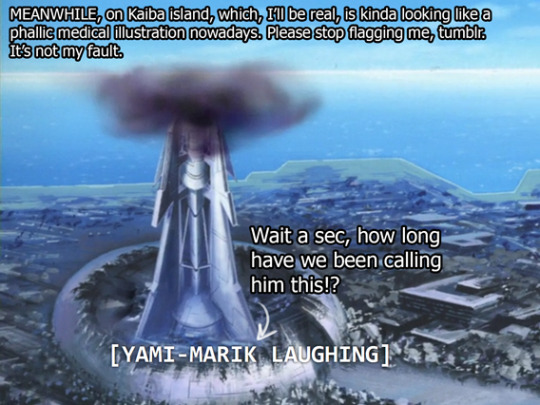
Ah, Kaiba island.
I’m not quite sure how big Kaiba island is. In this picture it looks like we got ourselves a 6 story building on the side, but if we compare the 6 story building to the tower it’s like...that’s a 100 story building, roughly? Our art team has given up trying to make this building look like anything other than what it looks like, and they’re just going to make a metallic cross-section of a dick every time it shows up.
Also, I kinda wish we saw a little bit more of the landing sequence to get here because....

....did we do an Akira motorcycle slide into this island or is that just me?
Meanwhile, as Joey is duking it out on the world’s largest, coldest dildo, Serenity is stationed at the post she made for herself.


LOL Why did they do this? Why would they design this?
(read more under the cut)
Inside the swamp cloud, Marik is shocked that Joey has been largely unphased by this horrific experience.
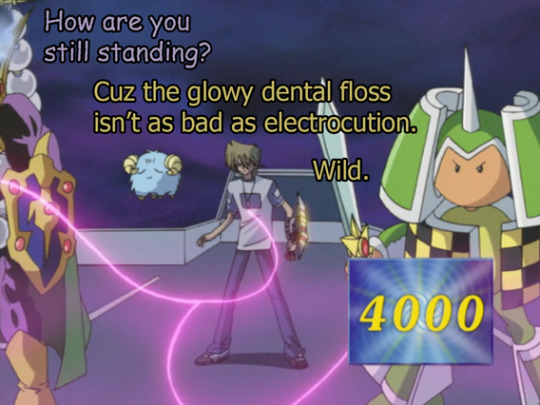
Clearly Marik has not caught on that Joey’s been conditioned to this stuff living with Yugi for the past many years, and a little bit of pink spirit-sucking wires aren’t really much of a match for that time Joey saw Yugi light a guy on fire with a match once. Well, a lighter. Either way, this isn’t so bad.
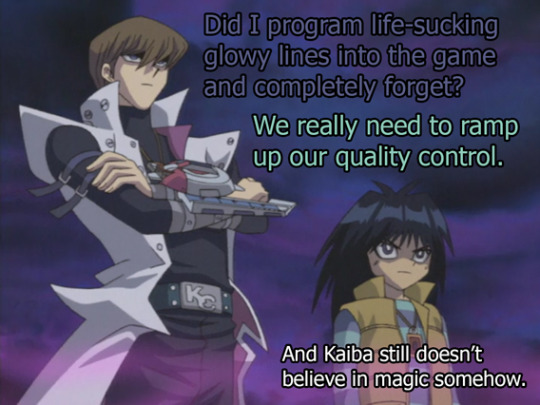
And then, I don’t really talk about card games here, but Marik introduces a new card I have not seen before.
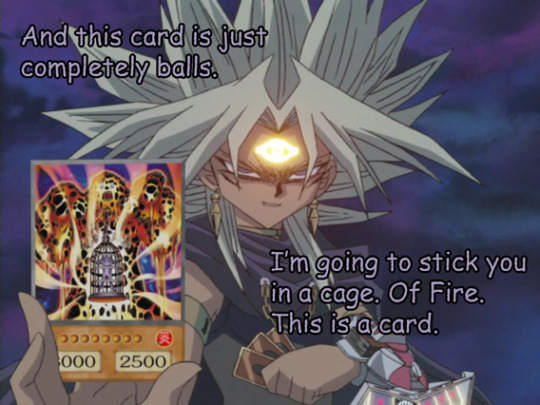

Behold, Lava Golem.
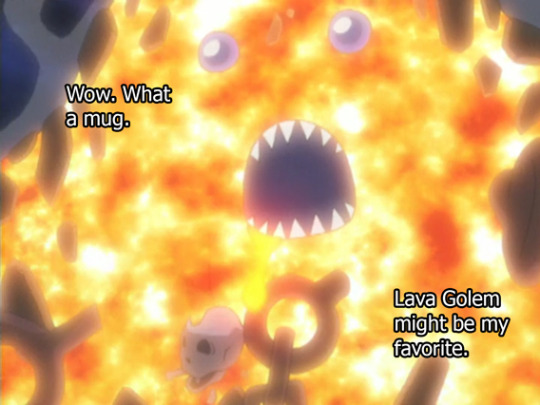
Look at him! Like I know everyone’s kinda freaking out about the new pokemon but like...Lava Golem? Remember that sweet face?
He’s just soooooo good.
Man this is the first Yugioh card ever that I’ve actually liked.

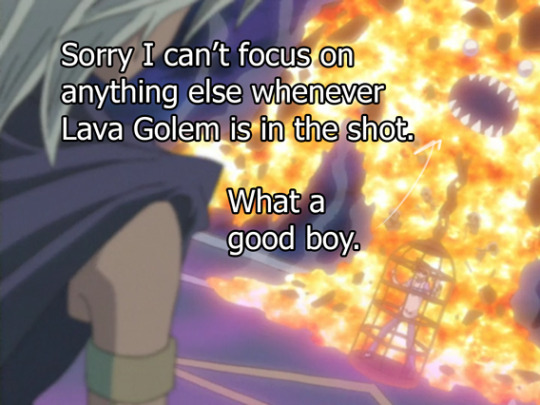
And, upon seeing this terrifying situation, Tea turns to Yugi and says:
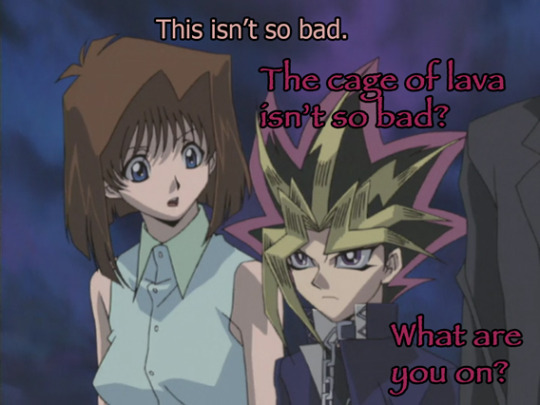
Thanks Tea.
Also during these few episodes, Marik is starting to undergo a transformation, mostly via his viens. It’s a look. Kind of worried about his blood pressure.

And I was thinking that they just invented a a chin vein, but, as it turns out, they actually did their research.

There is a vein there! I mean this isn’t really that big a deal to most of you, probably, but anime often gets a bad rap for ignoring anatomy (which ... it’s a cartoon so yeah that’s...that’s what you do in cartoons, you ignore most anatomy) but hey--they got this vein correct. I don’t know why they even bothered, but that was very nice of them to make something so gross so correct.
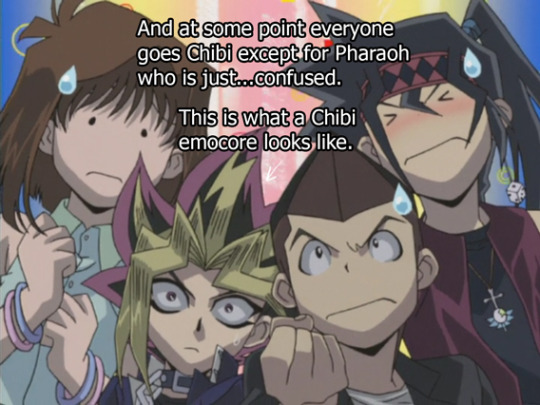
And because some of you might want this just for yourself, cap free:
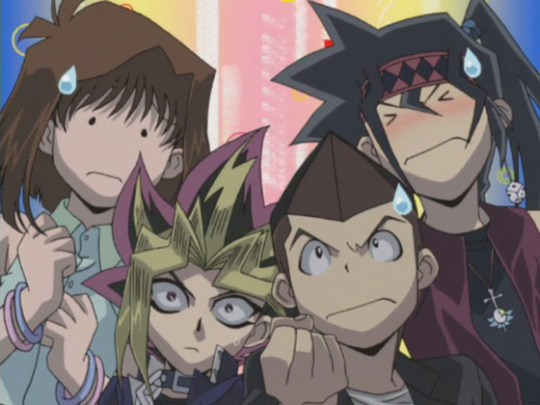
Enjoy.
Along with this good boy.

Is it just me? Is it just me that’s all ham about this Domo Kun face? This Mario mini-boss?
I usually don’t like the Yugioh monster designs but this one is just...he’s such a good boy.
Anyway, the art team was told at some point to change piss cloud and they decided to do this instead
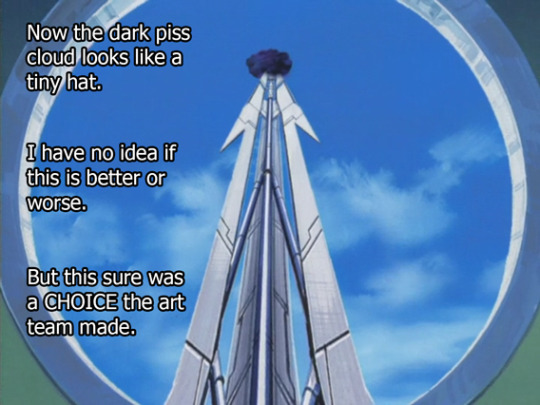
Why does the width keep changing on the tower? Like I know it was tossed between different artists but like...it just...it keeps changing and it bothers me.
Anyway, back to what matters.
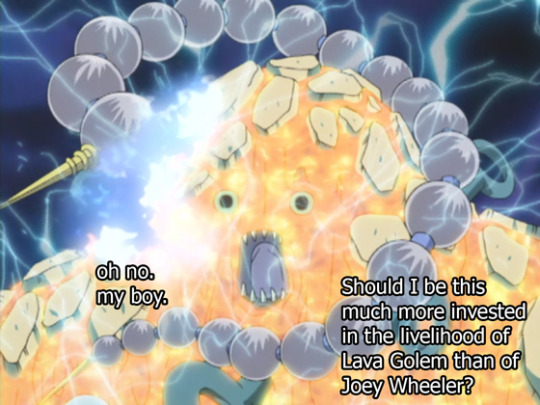
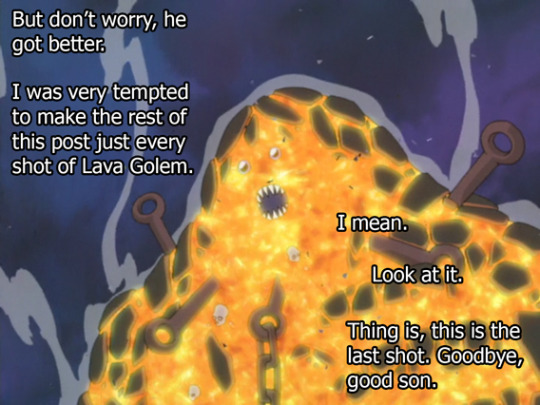
Can this be our new Joey Wheeler? Just leave everything about Joey Wheeler the same but replace his sprite with Lava Golem and with no explanation. I’d be down.
I do think that this arc brought back their A-team for the animation, there was just a lot more going on visually than we’ve had in a good while. Like this Marik face, for instance--this very famous face that I’ve seen drawn on like...a whole lot of characters. This is a much-referenced pose.
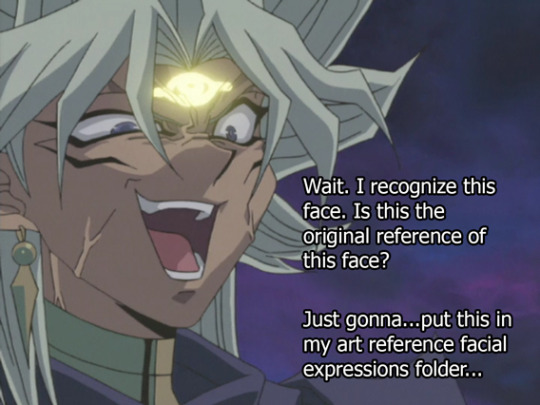
I mean, hey, not using reference while drawing is the same as dueling as Yugi Muto and just never using the Pharaoh. Like sure you could, but never, ever, ever do that.
And I just want you to know, I held that really corny anime art joke in for like a straight week on twitter as the entire world was going off about whether or not you’re supposed to use reference materials when you draw as if this is some sort of controversial topic (it’s not. No one cares about your process.) and y’all, it was HARD. But I did it. I resisted the discourse and still found a way to sneak it into here, into the side blog where I can go off about the inane art twitter discourse without getting blocked.
Which, again, was about “Can I use reference?” I...art twitter. Art twitter, I swear. why would you NOT? You have the Pharaoh, art twitter. You have the Pharaoh.
Anyway, I hope at least one of you got that joke. I hope one of you at least was like “lol--Art Reference is the Heart of the Cards.” and the next time someone tells you that using reference is cheating (which will never happen, a infinitesimal number of people in one forum on DeviantArt in 2003 said this once in the entire history of art, and I don’t know why twitter is fighting with these child-run forums that don’t even exist anymore) you can say “Don’t you dare talk about my platonic soulmate that way.” and just end the argument there.
The hell are these people who say artists don’t use reference? Do you write history papers without reading books?
And that’s my rant that was a.) too long for twitter and also b.) maybe too much anime. With art twitter it’s like..there’s no middle ground between too much anime and not enough anime. No middle ground and I have no idea where the people who follow me even stand. I think they just want to see Zelda. I think that’s about it. I really can’t tell with them. I’m like...always confused as to what those people want.
I need to delete my twitter. Anyways, back to Joey, who felt like breaking the fourth wall.

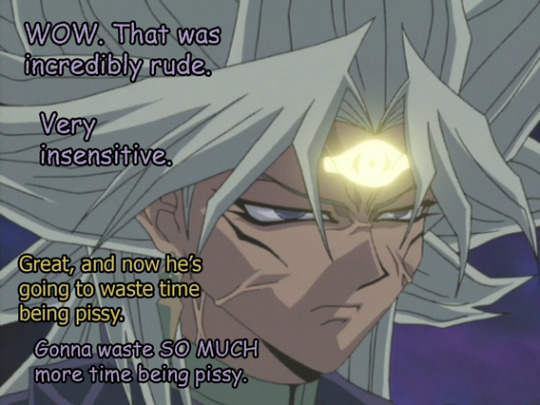
And so Marik decides to sober up and play the God card.
Yo guys, remember God Cards? I’ll be honest, I kinda completely forgot about them.
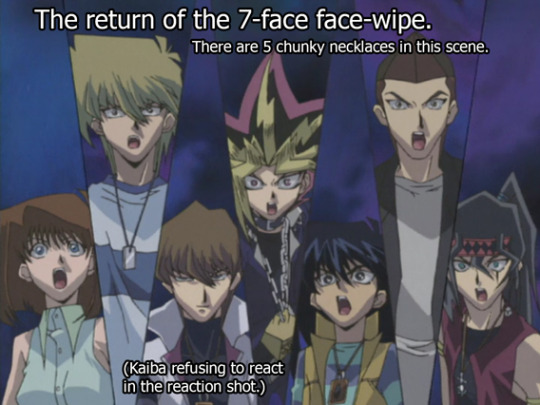
And then at some point this shot happened and I was living for it.
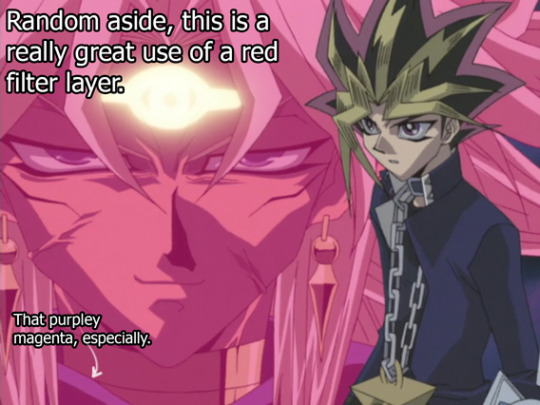
such a good idea to offset people in a different filter and kinda stack em. Bro was saying he remembered this sort of thing in Cowboy Bebop but I don’t remember what the hell he’s talking about. Bro and his spicy headcanons are mixing up Yugioh and Cowboy Bebop now. Never thought I’d see that.
And then Kaiba’s muscles kinda twitched and it looked like smiling.
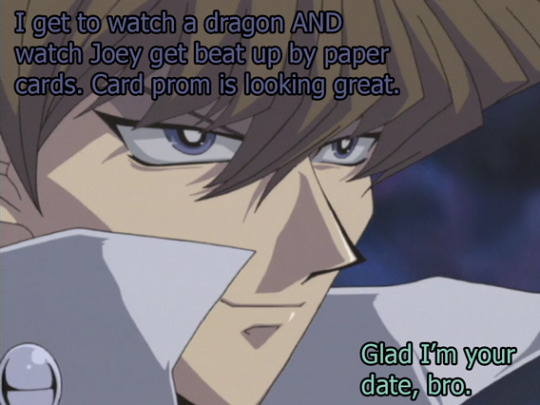
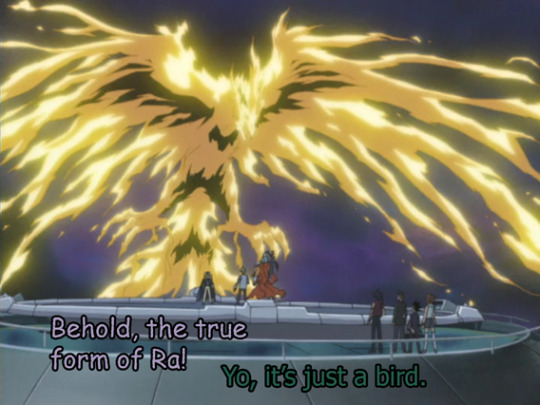
Man, were there a lot of phoenix references in the 00′s or is that just me who read way too much Harry Potter?
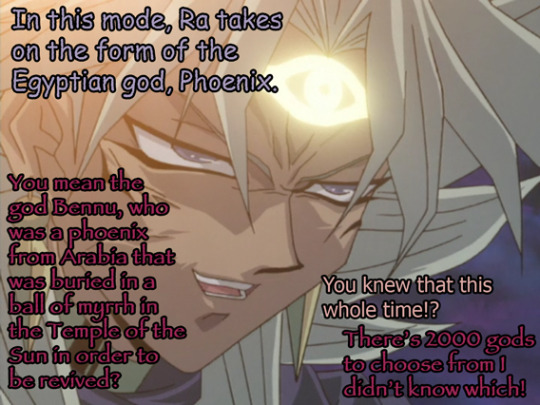
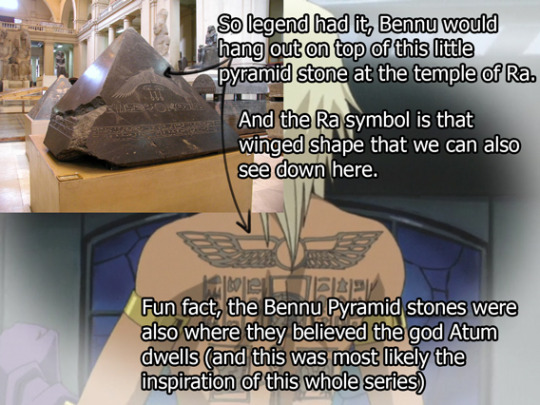
And like, because I do draw Yugi sometimes, occasionally people will reblog and tag with Pharaoh’s real name in there (I can’t really avoid that spoiler), so I think it’s pretty likely his name comes from Atum of Egyptian legend. Who...wasn’t really a Pharaoh. Atum was kinda weird, he gave birth to...himself. He’s an interesting read. But, we’ll get there when we get there.
But, I didn’t really know about Bennu pyramids until I actually went and looked up Egyptian Phoenixes. I had always thought that the Phoenix was Greek in origin but, according to Wikipedia some people say it happened in Egypt as well. And if it’s good enough for Wikipedia, it’s good enough for Yugioh.
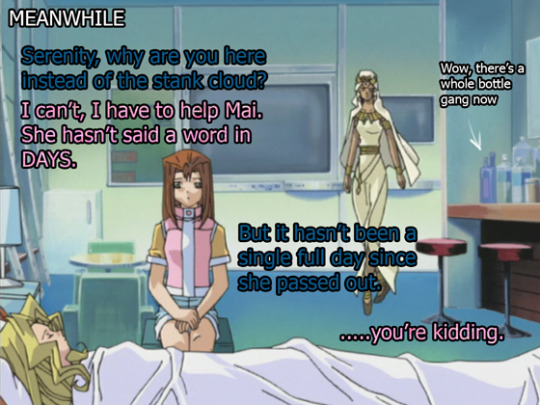
The return of the mystery purple moisturizer jug and it brought it’s entire extended family of fiji waters.
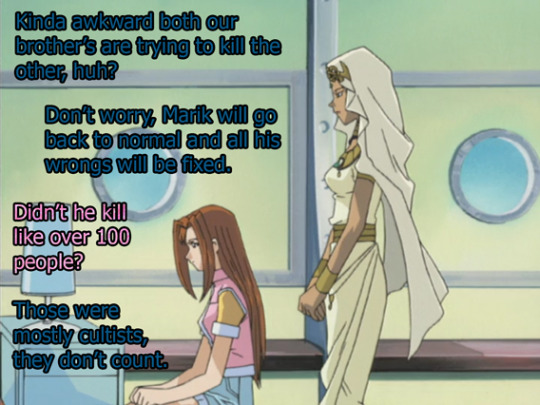
And so, Ishizu decides to do the right thing and take care of Mai. Not sure what Ishizu knows about being a nurse since she lived underground, but since she can help cure poisonous snake bites, maybe comas are a little bit easier?
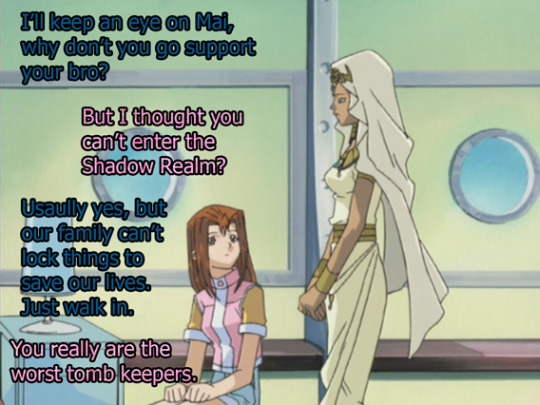
And so Serenity starts the 30 minute jog up the phallic tower to get to Joey’s death sequence. She’s made it to about...20 ft outside of the plane by the end of this episode. Serenity runs kinda slow.
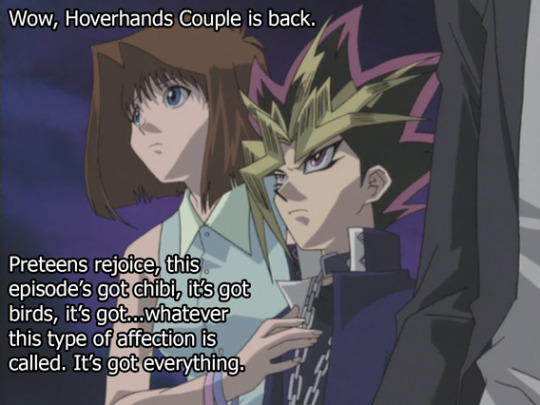
Bro mentioned that he thinks it looks like Tea’s trying to very stealthily steal Yugi’s wallet. And that’s just my spicy headcanon now, too.
Well now that’s over, lemme see if...

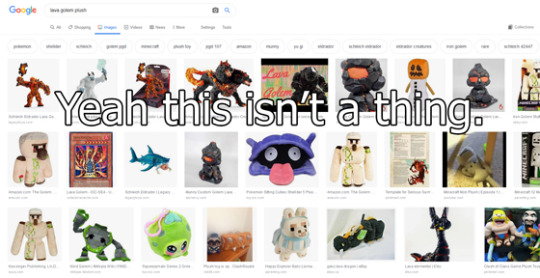
.......it could’ve happened. It only has like a couple of human skulls on it.
And hey if this is the first recap you’ve ever seen from me, here’s a link to read them all from the beginning in Chrono order, back when they weren’t color coded and I had no idea what the hell I was doing.
#Yugioh#yu gi oh#yugioh recap#photo recap#episode recap#s3 ep29#s3 ep30#Lava Golem#yugi muto#I wasn't expecting actual egyptian mythology to be in this show#joey wheeler#marik ishtar#serenity wheeler#ishizu ishtar#seto kaiba#tea gardner#tristan taylor#duke devlin
20 notes
·
View notes
Note
idk if you’ll care about this but your thing about the whole “fiction is just fiction” and “fiction doesn’t affect reality” argument is actually not true at all because let’s just say for example: having lgbt, poc, disability rep in books or media isn’t all that important because it doesn’t affect reality.... when it does? it makes a HUGE impact on people. but yes I see where you’re coming from and as a person who hates incest with a passion, I don’t think u guys deserve these threats AT ALL.
Thank you for not thinking I should die a violent death. And thank you for this ask! I love being asked things. And to respond to your point, that fiction does affect reality, with the example of how representation is pretty awesome: that’s a freaking good point you have there, that I agree with - partially.
This Essay is titled: Fiction and Reality and How the everloving Fuck do they interact and what by nathan wesninski’s underpants does that have to do with fandom discourse?
So, beyond the read more you’ll have a compilation of my thoughts on it (that didn’t take several hours to write and edit). I’ll talk about:
1. Definition Of Fiction, Definition Of Reality
2. (How) Does Fiction Affect Reality?
3. Representation In Fiction
4. Who Judges Fanfic?
5. ”this content is problematic,” says you. ”please don’t mention power dynamics,” replies I
6. Censorship
7. A Brief History Of Why Fanfic Is Awesome
8. Links to stuff that might interest you
I’m just gonna. Quickly do that part in radioactive with the deep breath.

To start this, I want to clarify that in the response I made to transneiljosten’s post, I never explicitly said “fiction doesn’t affect reality” or “fiction is just fiction.”
What I did say is this: “Incest in fiction is just that: incest in fiction. It’s. not. real.” And: “I believe everyone should be allowed to write/create what they want - as long as it doesn’t hurt people in real life.”
But yes, the phrases “fiction is just fiction” and “fiction is not reality” have been used often when discussing freedom to write fanfic and when defending content another might call immoral. Not many people have elaborated beyond that, and to be fair - it’s a super big fucking field of study with so many subjective ways to look at it that it’s difficult to put into words.
But I’m gonna go and explain what people mean with those two phrases anyway.
Disclaimer: Remember how I called this a super big fucking field of study? I am no linguist and I have not studied literature. All my knowledge comes from years in fandom and internet research of the topics I personally found interesting. I may be wrong about things I say here, and I am always learning, so feel free to message me. I try my best to discuss controversial topics thoughtfully, respectfully, considerately and carefully, but I am only human and do not know everything. You are welcome to join the discussion.
1. Definition Of Fiction, Definition Of Reality
Going to https://en.oxforddictionaries.com/ to properly look this up:
Reality: The state of things as they actually exist, as opposed to an idealistic or notional idea of them.
Fiction: Literature in the form of prose, especially novels, that describes imaginary events and people.
So I say I don’t study literature (I really don’t) but just a few weeks ago I was in a lecture on the absolute basics of literature science, where I learned this dope sentence:
Die Wirklichkeit in der Kunst ist nur eine auf die außerkünstlerische Wirklichkeit verweisende Wirklichkeit.
Which is German, yes I know. Basically we have the starting point that literature is art, so it’s: "the reality in art is only a reality that refers to the reality outside of art" or, in other words, fiction is only ever fiction and not reality, no matter how close they may seem to be.
In summary, what we can say for sure: Fiction does not equal Reality. They are not the same. Fiction exists because Reality exists.
2. (How) Does Fiction Affect Reality?
Reality affects fiction. But does Fiction affect Reality?
Allow me to quote tumblr user shinelikethunder, who put it very nicely:
“Fiction affects people. And people affect reality.”
Tumblr user muchymozzarella made an important addition (and the blog is really pretty) so to read the post, klick on this link: https://muchymozzarella.tumblr.com/post/167137950299/fiction-is-not-responsible-for-reality
If you read the above post, further reading that might interest you are texts by Immanuel Kant and Arthur Schopenhauer on Free Will. But that wouldn’t be fandom anymore, so like, find philosophy books in your local library and talk to you friends about it.
3. Representation In Fiction
But let’s come back to your question, dear anon: “... the whole “fiction is just fiction” and “fiction doesn’t affect reality” argument is actually not true at all because let’s just say for example: having lgbt, poc, disability rep in books or media isn’t all that important because it doesn’t affect reality.... when it does? it makes a HUGE impact on people.”
You have a great point. Representation in books matters. (If you rec me some nice wlw books I’ll love you forever, there are not enough.)
I am, however, gonna quote my friend of mine, who says it better than I ever could:
“There is a difference between media affecting behaviour and representation in media. Like, violent video games don't actually make you violent. Watching gay cinema isn't going to turn you to the lgbt side unless there was already a disposition there.
People read and write immorality constantly, and even when it's shone in a good light it's usually expected that we as human beings know right from wrong, know fiction from reality. Humanity has explored the happy shiny purity of the universe and the horrific grittiness since... Well probably forever, for a variety of reasons. And in recent years the way we consume media has intensified drastically. Our consumption is interactive, our interaction is globally influenced and sometimes that is good, but we've also given ourselves the right to witch-hunt without a lot of information, or because things don't go as you planned. Real people are always more important than fictional people.
Stand up for representation. Stand up for good representation. But if you're smart enough to understand morality in reality, that isn't going to suddenly go away if you read some incest fics... And hey if you do suddenly want to kiss your brother, that's something for you to deal with and it isn't fan fiction's fault.”
Representation in books matters. Why does it matter? Because the real world is so much more diverse than popular media might make you think. Fight against the patriarchy, not against random people on the internet.
4. Who Judges Fanfic?
Fanfic is written by fans. It’s also written for fans, but more than that, it’s written by fans. I’m not gonna say only teenage girls write fanfiction, because that’s not true. Fans write fanfiction. And everyone can be a fan.
Ozhawkauthor said:
“You are not paying for fanworks content, and you have no rights to it other than to choose to consume it, or not consume it. If you do choose to consume it, do not then attack the creator if it wasn’t to your taste. That’s the height of bad manners.
Be courteous in fandom. It makes the whole experience better for all of us.”
So why are “antis” suddenly here, declaring this ship and those characters off limits and to be hated on?
Specifically, what the fuck are fans that attack or judge other fans on?
To quote shinelikethunder (again): “Fiction needn’t be educational and fiction doesn’t always have clear-cut endorsements of who’s in the right. But the discussion that happens around fiction can include both.”
But to answer the question above: Who Judges Fanfic? Not. You.
5. ”this content is problematic,” says you. ”please don’t mention power dynamics,” replies I
Hypothetical situation:
I write a fanfic. My protagonist is Riko Moriyama, who is, in canon, a sadistic asshole that is so morally black that his own brother, Ichirou, who is also morally black, kills him in the end. It doesn’t matter what I write, or who I ship him with, in this hypothetical situation.
You appear, you read the fic or you don’t read the fic. You say: “This content is problematic.”
I quiver. I know you don’t like Riko Moriyama. I know you don’t approve of my shipping choice. “Please don’t mention power dynamics,” I reply.
“This relationship is toxic,” you say. “There are unhealthy power dynamics at play.”
And like, fuck, I know? I wrote it.
Obviously. Obviously I could reply with that ancient, age old phrase “Don’t Like Don’t Read.”
But I already made a similar post about that.
6. Censorship
I’m writing this post to fight against censorship in fandom. (The day I am typing this up on was the day I went to a demonstration against articles 11 and 17, earlier 13, in the copyright reform in the EU, and to protest for a free internet.)
Censorship.
What does that even mean? The Oxford English Dictionary says:
Censorship: The suppression or prohibition of any parts of books, films, news, etc. that are considered obscene, politically unacceptable, or a threat to security.
Here’s the wikipedia article.
In my opinion, every person, regardless of whether or not they call themselves “anti” who tells someone else that their fanfic is disgusting and wrong and should be deleted, based on subjective ideas of moral, is trying to enforce censorship. So don’t. Don’t do that.
“But,” you might say. “Riko is not a good person.”
And you know what? You’re absolutely right. He’s not. Neither is any of the Foxes.
And this is why none of the antis make sense. In one post, they condemn Roland - a perfectly normal minor character, and in the next post they call Andrew Minyard their soft angel child. Y’all. Not to hate on Andrew Minyard, but he literally drugged Neil? Even though he’s so big on consent, he drugged Neil?
So by saying this and that are problematic and should not be written and the people who do write it should be blocked, you’re kinda hypocritical. Because the All For The Game trilogy is one fucked up piece of media by itself.
And have you ever read a book?
Most books have characters that aren’t completely morally white or morally black, events that aren’t always sunshine, butterflies and rainbows.
And you know what else? That’s a good thing. Because the world isn’t like that either. And more often than not literature addresses topics critically.
Remember The Hunger Games? Exactly.
7. A Brief History Of Why Fanfic Is Awesome
In the beginnings of fanfic and fandom as we know it, slash was illegal in the USA. Fanfiction.net was made in like 1998, and during the first few years when fanfic got more attention with the rise of the internet, restrictions were made.
Much like tumblr in december 2018, except worse, fanfiction.net purged explicit content. Livejournal, the journaling platform where lots of fandom stuff happened before tumblr, is known for strikethrough, a big, unannounced deletion of fannish content. Because of those purges and restrictions, ao3 was originally made. I’m not trying to paint ao3 as the heroes that saved fandom, well I kinda am, and they are doing great things so that fanfiction can exist and remain accessible.
I think fiction is not just fiction. But fiction is just fiction in the sense that it doesn’t have any direct influence on the real world. We are all allowed to write whatever we want.
Disclaimer: We are all allowed to write whatever we want, except when we call for violence towards others in real life. Further disclaimer: Calling for violence towards others is illegal. Hate speech is illegal. Violent threats are illegal. Promotion of self-harm is illegal. Death threats are illegal.
To come back to fandom: Shipping or not shipping something has nothing to do with morals. Hating on people who ship “unhealthy power dynamics/problematic ships” does not give you the moral high ground. It makes you an asshole. For the love of Riko’s stinky socks, use the blocking feature.
My friend iknowwhoyouaredamianos said: “Hating people irl, lashing out against them, that's the real cruelty. That's so much worse than writing about something fictional.”
If you hate on real people, there is no trigger warning. You can’t don’t-like-don’t-read hate. It will affect that person’s life negatively, whether you intend to do so or not. Don’t be assholes, dears.
Thank you to my friend, and to iknowwhoyouaredamianos for letting me quote you and joining the discussion; and to foxsoulcourt for so many reasons.
Who knew that writing over 2000 words on fandom would be fun?
Dear anon, I hope I answered your question.
I’m gonna conclude this post with the Three Laws of Fandom:
I. Don’t Like; Don’t Read.
II. Your Kink Is Not My Kink.
III. Ship And Let Ship.
8. Links To Stuff That Might Be Of Interest
If you read all of the above and still feel like you don’t understand, have this awesome post by destinationtoast: How to not like fictional things (and not be a dick about it)
Podcasts on fandom culture by fansplaining:
Episode 84: Purity Culture
Episode 85: Age and Fandom
Episode 86: The Money Question
Episode 87: What we discourse about when we discourse about the discourse
Fandom positivity posts I reblogged (because y’all need it):
short post on staying positive in fandom
when discourse gets too stressful
important advice especially for those of you younger than 15 (but also older)
Tumblr user freedom-of-fanfic is writing lots of essays on lots of fandom things, here are some those more or less directly relate to this:
On criticising: Free to write whatever, free to criticise whatever?
A post on Fiction & Reality that answers a question very similar to the one I answered,
and Why fanworks are such a convenient social scrapegoat (kinda a socioeconomical discussion of USA-centric fandom)
There is also a very extensive FAQ by freedom-of-fanfic, with lots of very important writings on fandom culture on tumblr.
Unrelated, but if you’re interested in more of fandom, fanfic, and statistics of both:
http://destinationtoast.tumblr.com/stats
Interesting stuff on Fanlore: Purity Culture in Fandom, AO3 & Censorship, The Advantages of Fan Fiction as an Art Form.
An article on the free speech debate in fandom
Dreamwidth’s Diversity Statement, and Ao3’s Diversity Statement
A cool (and unrelated) thing: Femslash can save the world if we let it
Happy reading, and I hope you learned something.
14 notes
·
View notes
Text
This is when I miss Livejournal a little, because sometimes a person just wants to deliver a tiny rant and not enter into a Discourse. However, here we are.
Last night I reblogged a post about Titanic, and then re-reblogged it to go “and one more thing!” It’s funny how Titanic posts seem to encapsulate some of the stuff I find frustrating about conversations on Tumblr. [And here is the cut, because I find long posts annoying to scroll past and I am probably not alone.]
The post last night begins with an article which I admit I did not read, because it was the followup discussions that caught my attention. The first reblog included the quite incredible statement that “Titanic was built for comfort, not for speed” and therefore would not have been going particularly fast during the crossing, and therefore... well, something about a conspiracy surrounding the circumstances of the sinking, which the next reblogger amplified.
But that argument falls at the first hurdle, because Titanic and other transatlantic steamers were not Carnival cruise ships, and of course they were built for speed. The big liner companies vied for the transatlantic crossing record and took it pretty seriously, because in those days the only way to cross the Atlantic was by ship. Lindbergh didn’t fly across the Atlantic until 1927, and transatlantic flights certainly weren’t routine immediately after that. So the rich passengers wanted to cross in comfort, but they were crossing the ocean because they had things to do on the other side. They generally weren’t crossing just for the sake of the cruise, and they didn’t want to fritter about for five days if another line could do the crossing in four. And remember there were over 700 passengers in steerage. The White Star Line was absolutely in the business of moving people from one place to another, and they wanted to do it as fast as possible.
The last comment in the reblogged post ends with the fairly Tumblr-typical statement that “everyone thinks the tragedy was unpreventable!” This is the kind of thing that drives me nuts on Tumblr, someone stating a position that flies in the face not only of common sense but common knowledge, and pretending it’s what “everyone else” believes so they can pretend to be the font of knowledge. Nobody thinks the Titanic tragedy was unpreventable. Nobody. Facts have been chewed over, blame apportioned, and fingers pointed for literally one hundred years, from the two original boards of inquiry onwards. Just stop it.
Also, as a friend of mine says, anyone who believes in gigantic conspiracies and coverups has never worked on a group project. Ever. Apart from the women of Bletchley Park, no group is that good at doing their bit and keeping their mouths shut.
And while I am at it, that post that goes around periodically, telling the story of RMS Carpathia and her utterly competent captain, Arthur Rostron? Also common knowledge. It floors me when that post is reblogged with comments like, “No one knows this! I have read about Titanic all my life and I had never heard of the heroic Carpathia!” The only sensible reply to that statement is, then read better scholarship. Because the role of Carpathia is absolutely common knowledge. (Although I concede that, since I live in Halifax, Nova Scotia, my view might be skewed. And it that looks like a non sequitur, read better Titanic scholarship.)
Truly. The first thing I ever read about Titanic was a scruffy old book published in late 1912, and republished for the centenary, called The Sinking of the Titanic and Other Great Sea Disasters. (My parents had a lot of scruffy old books that were more interesting than they looked.) That book included lots of information on Carpathia and her captain. And pictures! EJ Pratt wrote about Carpathia in his poem “Titanic” which was published in 1935. Walter Lord, in his 1955 book A Night To Remember (the book which is often credited with kicking off the modern fascination with the sinking) wrote extensively about Carpathia and Rostron. Lord’s book is only about 200 pages long. It’s the common starting place for folks wanting to know about Titanic. Wikipedia includes links to Carpathia’s story in its entry on Titanic. I find it difficult to believe that anyone could read more than two decent sources on Titanic and not run across Carpathia. (And don’t blame James Cameron for not including that story-- Cameron wasn’t making a documentary. He was openly making a fictional movie about a make-believe romance, “set against the backdrop of” real events, which is absolutely a thing artists do. I don’t care for his movie, but I’m not blaming it for not being a thing it was never intended to be.)
In summary... I don’t know. Be critical. Look at other sources. And don’t fucking take everything on Tumblr at face value or assume Tumblr posts are giving you secret information without double checking. Tumblr likes to pretend it’s giving out information that’s otherwise suppressed by The Man, but just because you personally don’t know a thing doesn’t mean a ton of other people don’t know it already. They do. And they’ve written books about it.
9 notes
·
View notes
Text
blog 04 - avatar (the one with the blue people not the last airbender)

preface
I went into this with absolutely no feelings about this movie beyond the absurdity of how many sequels it’s apparently going to get. As an artist, I find the visual effects extremely impressive even to this day, but as a storyteller, I thought this story was almost so inoffensive that it’s offensive.
However, I think that engaging with things in good faith is a good way to find ways to expand your horizons and thoughts, and I like to enjoy things despite my dad’s insistence that I like to not enjoy things. (It’s not that I like to not like things, it’s that it’s easier to entertain people when it’s a bad review. Tough crowd.) I’m a firm believer in the idea that cerebral analysis of media adds to the joy of consumption rather than takes away from it, so let’s dive right in.
I like structure, so we’re gonna layer it like a delicious theme cake.
1. the elephant in the room
Everyone has seen Pocohontas. Everyone has seen Dancing With Wolves. I’m not really here to rehash arguments, but I think getting into this movie without addressing what first comes to everyone’s mind when they think about it is pretty much impossible. The “White Savior” trope is more or less a narrative cliche in which a noble white person will take a stand against the Bad White People on the side of a sympathetic oppressed people-- Native Americans see this plotline probably the most, but black people still see it today every now and then (Green Book got nominated for a lot of Oscars, after all. The hunger is there for easily digestible feel-good race relation drama.) Wikipedia sums up the White Savior trope better than I could, so here it is:
“At the cinema, the white savior narrative occupies a psychological niche for most white people, as an expression of their latent desire for interracial goodwill and reconciliation. By presenting stories of racial redemption, involving black people and white people professing to reach across racial barriers, Hollywood is catering to a mostly white audience who believe themselves unfairly victimized by non-white ethnic groups, because they are culturally exhausted with the unfinished national discourse about race and ethnicity in the society of the United States. Hence, films featuring the narrative trope of the white savior have notably similar storylines, which present an ostensibly nobler approach to race relations, but offer psychological refuge and escapism for white Americans seeking to avoid substantive conversations about race, racism, and racial identity. In this way, the narrative trope of the white savior is an important cultural artifact, a device to realize the desire to repair the social and cultural damage wrought by the myths of white supremacy and paternalism, regardless of the inherently racist overtones of the white-savior narrative trope.“
Native Americans factor into this most significantly in the case of Avatar-- aliens in movies are hardly ever just aliens. Whether they represent an oppressed underclass (District 9), childhood innocence (E.T.), or fear of foreign invasion (War of the Worlds), aliens are an easy vessel to carry almost any idea you want them to. So if the Na’vi are more or less an ideological stand-in for Native Americans during the conquest of America, our protagonist Jake is the future space cowboy to the Cowboys and Indians In Space.
Both Jake and Grace sort of fall in and out of the White Savior space-- ultimately Grace condescends to the Na’vi a little more and she has a more complete character arc that ends with her transcending this trope, but Jake is whole hog in it. He’s like, the legendary prophecy warrior. He’s The Guy.

(Pictured above: The Guy)
James Cameron grapples pretty hard with the White Savior trope-- he never truly goes one way or another about it and the concept of Avatars-- as in the Na’vi bodies that Jake and company jump into-- significantly...well, complicates the idea of race relations in this movie. There are certainly some uncomfortable ideas about identity wrapped up in the concept of body swaps (if this idea interests you, Altered Carbon is a really good read), but re: the readings and lectures, the concept kind of works towards what is ultimately the broad takeaway of the movie.
In summary: no, we’re not doing this whole review about White Guilt in Space. Now that that’s out of the way...
2. james cameron predicted late stage capitalism
Imperialism
"The policy of extending the rule or authority of an empire or nation over foreign countries or of acquiring and holding colonies and dependencies."
Avatar is about imperialism. This is as broad and pointed a theme as you can get from a movie that draws such heavy inspiration from Native American and Aboriginal cultures. Interestingly enough, the movie’s futuristic setting goes hand in hand with the commentary about the military and Western Imperialism.
The company in Avatar, and all the almost comedically evil military men, are very brazen about their lack of ideological purpose. They are on Pandora for money. They are being paid to go to Pandora to take its resources-- the delightfully named “Unobtanium” in specific. As mentioned in the reading, Unobtanium is valuable for its properties as a superconductor, and I’m not a STEM kid, so I’ll leave it at that for simplicity’s sake.
That the mercenary force on Pandora is so open about their exploitative intentions draws an interesting parallel to the world of today that’s maybe a touch haunting, considering that Avatar came out some years ago. In politics, at least up until now, you notice the use of a few common euphemisms as smokescreens for more extreme ideas-- for example, the Right’s: “protecting American jobs”.
Protecting American jobs is a euphemism for racism against Mexicans-- it was the most common smokescreen reasoning for the border wall pre-Trumpian politics. Trump and company have since dropped the euphemism all together. The death of a euphemism usually means that the euphemism is no longer culturally or socially required-- you can just come out and say whatever horrible thing you mean. In Avatar’s universe, it’s clear that the political-economic climate has come to a point where they can just say that they’re there to steal the Na’vi’s resources whether they like it or not.
The movie and the lecture both draw specific attention to the parallels the film draws explicitly between military tactics used in the movie, and real-world events. “Shock and Awe”, a tactic coined by the Bush era, is referenced in exact terms-- it being a display of overwhelming force intended to break the fighting spirit of the enemy. The commander character whose name I just read but I can’t remember now says that he is a veteran of both Venezuela and Nigeria-- both real world locations in which the U.S. has invaded and destabilized for material interests under the guise of American ideology.
In Avatar, we see the thin veneer of “freedom and democracy” as the driving forces of U.S. intervention stripped away explicitly. The opening narration of Jake’s arrival to Pandora has him say that “on Earth, these men were soldiers fighting for freedom...but here, they’re mercenaries”, however, the line between a supposed freedom fighter and a mercenary is borderline nonexistent.

3. western scientific objectivism sucks
Another current running through Avatar is the juxtaposition of what is “real” with what is “unreal-- aka Western objectivity science versus belief systems. This is embodied in the character of Grace, a scientist and anthropologist who has been researching Na’vi culture for some time. The reading characterizes her as “the happy face of liberalism” that tries to put a nice coat of paint over the same imperialist ideas that the more blunt military types embody-- she is kinder to the Na’vi and sees their culture and planet as worth preserving, but she is ultimately dismissive of their beliefs and of Eywa (”pagan voodoo”) the same as the other mercenaries.
We’re gonna put on tinfoil hats for a little bit here to make a relation between Western culture (imperialism and colonialism) and capitalism and paganism. Are you ready?
Okay.
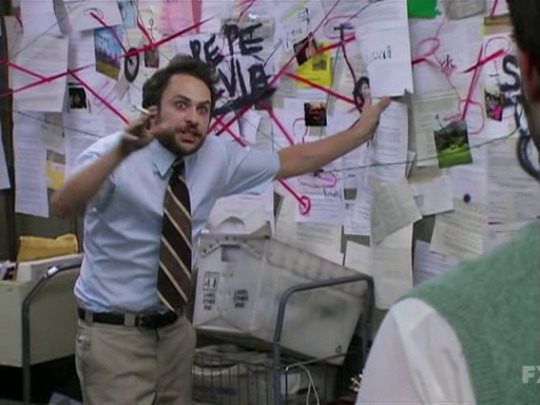
So you know how they burned witches at the stake at the onset of the Industrial Age in America and the pagan practices of “hedge magic” were pretty much obliterated? I don’t think that’s a coincidence. Capitalism is a system that can only operate materialistically-- people aren’t “people” but “workers”, and the concept of magic and belief exists in terms that capitalism can’t define, and more importantly, can’t exploit. So witches were burned and women were placed with great reinforcement back into domesticity, where their function in capitalism was to give birth to and rear new workers.
You can see this dichotomy between the science of objectivity (what is “real”) and belief systems (what is “unprovable”, “unobservable”) in the way Grace uses scientific terms to justify the Na’vi’s spirituality. A very powerful through-line can be seen in the way that imperialism, capitalism, materialism, and objective science intersect. Their interconnected natural collective consciousness is like the raw function of a brain to her, likened to a network. It isn’t until Grace is mortally wounded and experiences the Na’vi’s healing ceremony that she is able to transcend the capitalistic, materialistic terms for definition for Eywa to have a spiritual experience, and to become one with Eywa herself (”she’s real.”)
In a plot that hinges on the material (Unobtainium) interests of a capitalist mercenary force, the ultimate refutation of this is the Na’vi’s spiritual values.
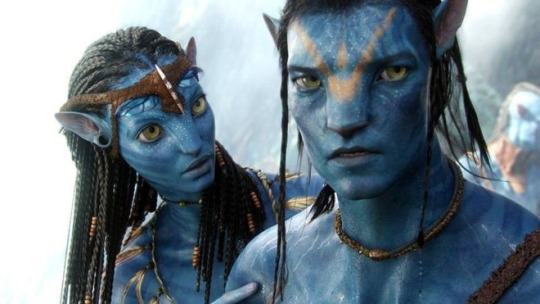
4. avatar: endgame
So what is this all working towards? Well, the idea of an interconnected spirituality like Eywa. The idea takes root in geomantic ideas, more commonly known as “feng shui”-- it’s sort of the concept of an earthly energy, a flow that moves through and connects the Earth and its people and creatures. The strange braid cord things that allow the Na’vi to interface with certain points and other creatures is a very straightforward metaphor for that concept of feng shui and geomancy.
Here we come back around to the concept of Jake as the White Savior/chosen one/The Guy. It’s kind of obtuse, but the general theory is that Eywa chose Jake as a sign that all peoples must needs transcend their boundaries and become one with the larger concept that Eywa represents. This of course comes packaged with an urgent environmental message-- our life is that of the planet, and to exploit and sacrifice one is to sacrifice the other.
Pandora, Eywa, and the Na’vi represent the polar opposite of everything that capitalist imperialism is. Thus, James Cameron, ironically, used a huge budget Hollywood endeavor to refute everything that Hollywood is. Now he’s making Alita: Battle Angel.
Funny how that works. Oh, I made myself sad.
3 notes
·
View notes
Note
do you know any neutral post that sums up the Israeli–Palestinian conflict because I don't know what to think. I don't want to dislike jews or Israel but it all sounds so bad? Send help
Hi! I super appreciate you asking because I know exactly how hard it is to even find one reliable source.
Of course it all sounds super bad, because Hamas is a well-oiled and functioning propaganda machine with a lot of money and children and parents willing to throw themselves in front of the camera to make Israel bad, and for some reason their pictures are always what get picked up by the media. Plus, there are super loud antisemitic voices everywhere chanting against Israel at every mention. And the BDS is lobbying pretty hard too, so it's very hard to not find a super negative picture.
It's a super tricky conflict. I'm not saying everything went well and Israel is a country with a pristine history. But here's some points to consider that are usually the biggest issues in any ''''controversy'''' around Israel- Jewish people have always lived and practiced Judaism for over 5000 years in Israel. They have been victims of pogroms and hatred and chased in the desert, but they have literally always been there and to say that Israel was a state installed by foreigners for foreigners coming to these lands is a blatant lie.
There are countries with way more questionable borders in existence, yet Israel is the only country to continuously has to defend its very existence.
The United Nations have two organisations for refugees. One is the UNHCR which deals with refugee questions for all over the world, except for one group. And the other is the UNRWA which is an organisation only for the Palestine/Gaza refugees. The differences between these organisations are more than in structure and beaurucracy, they have two different tasks: UNHCR aims to give refugees a home, UNRWA doesn't. When in 1951 the director of UNRWA proposed to give 250.000 refugees a home in different arabic countries, these governments were angry and strictly refused, leading to the director John Blanford to lose his job. Since then, no further attempts have been made.
Furthermore, the UNHCR only defines refugees as people who have actually fled from their homes. Meanwhile, the UNRWA broadens that definition to "people who lost their homes in 1948 and their descendants".
- Israel is the only country that won all their wars for their survival and in self-defense yet had to have the coniditions for peace dictated by the defeated enemies. Even more paradox, this was supported by countries which all defined their borders after winning wars over these territories -- like, look at an old map of Europe and you will see what I mean. Btw Europe, Germany and Poland drew their finite borders in 1990 but I guess Israel is the only ''''artificial'''' state
- One of Hamas' conditions was that no jewish people were allowed to live in Gaza, so for the first time in centuries if not more, there are no Jewish people living in Gaza. Weirdly, it doesn't seem enough because these people are still living somewhere else and not all dead, I guess.
- Hamas literally uses children and families as a shield, regularly raises palestine flags with swastikas and calls protests of throwing rocks, burning tires and attacking soldiers 'peaceful'. It's a terrorist organisation and literally has the destruction of Israel as a defining goal, yet we always expect Israel to work with them. Hamas wants to build a state based on ethnic purity and cleansing of the territory, but somehow everyone thinks it's okay.
- By the way, when the two state solution was on the table, it was refused because they didn't want Israel to even have a bit of Jerusalem, the capital city with which the jewish people has been connected for over 3000 years. Even weirder, this connection is widely known (famously written into the most read world book in the world, the Bible) and yet every country refuses to acknowledge it as the official capital city because they're afraid that terrorists will riot
- Israel is the only country which is continuously attacked by three organisations in the UN which only exist to represent the Palestine agenda and to defame Israel (they're three comitees and I can't remember their exact names even in German, but they're about realising Palestinian rights, researching the Israeli actions in regard to palestinian rights and there's something in the UN-department for politic agendas or somth)
- Every year. Every year, Israel is targeted by more UN-resolutions than all of the other 192 member countries together. No-one can tell me that this number is justifiable in the least, but it is a reality and it paints the picture of Israel in the media.
- Israel is also the only country in the UN that continuously has to defend its existence against other UN-members and that suffers threats from other members all the damn time. And not just any threats, Iran for example continuously threatens to wipe out Israel and supports Hezbollah in Lebanon and Hamas in Gaza, both of which are terrorist organisations with the goal of destroying Israel. And destroying Israel means killing all their Jewish citizens.
And we continuously forget that Israel is the only liberal democracy in that area, they're currently conducting investigations into Netanyahu and his regime and it's a country with a rich and vivid discourse nature. They just refuse to let their existence be up to debate, and frankly, neither should any of us.
So, does this mean no-one is allowed to criticise Israel? Absolutely not. It is a functioning democracy and like any country, it is not a moral entity and there is a lot of room for debate. But when looking into the arguments, you should keep in mind that there's a lot of antisemitism hidden as 'Israel critic' when it's just the same old shit. There's a test called "the 3 Ds" (in German) that can function as a broad test to see if you're reading legitimate critics or antisemitic shit:
- Demonisation (are they demonising Israel, for example by comparing Israel to the Nazis or the palestine refugee camp with Auschwitz)
- Double standards (are they criticising Israel for a behaviour or an act that they ignore or belittle when it's different state, for example how is it that Israel suffers resolutions for hurting human rights but China, Iran, Kuba and Syria don't)
- Delegitimisation (when they're arguing against Israel to exist; it's also a double standard bc it's refusing to allow Jewish people to have a state in which they can live a safe life)
I realise this won't directly answer your question and I easily get side tracked, but I feel like knowing about these difficulties and critically reading your sources will help you more than just drawing a timeline of events. Because there's a lot of anti-Israel propaganda even on Wikipedia, on seemingly normal internet platforms and even our big Western media liberally use Hamas material while refusing to show the Nazi swastikas blowing on burning kites they shoot over to Israel ground. And it's hard to be neutral about this topic, because it is a democracy which is never flawless against a terrorist organisation which demonstrates great finesse in painting the picture the way they want it. I don't think we should all be neutral about it. I am firmly pro Israel because I need my Jewish friends who are currently worrying about anti-judaic sentiments on the uprise everywhere in Europe to have a safe haven. I am pro Israel because it is a country with huge efforts and contributions to our world and advancing medicines etc every day. It's a LGBTQ friendly country (contrary to Hamas policy in which gay sex means 10 years of prison). It is the only liberal democracy in the Middle East and deserves our support more than a terrorist organisation using their children as human shields. Yknow. Maybe that's not actually a topic to be neutral about.
11 notes
·
View notes
Text
A self-interview
It is difficult for a man to speak long of himself without vanity; therefore, I shall be short.
- David Hume, My Own Life (1777).
A few people have expressed some interest in knowing about me; this post aims to answer their hypothetical questions. Following Kurt Vonnegut’s cue, this will be a self-interview, in which I ask myself questions and then reply to them.
I answer the following questions: some of them might seem pretentious - but all of them are questions I’d like to ask people, and all of them are questions I thought people might want to ask me.
What’s the most important thing to know about you?
What subjects do you know about most?
What are the most important things you’ve learned in life?
What routines do you have?
How do you decide what to post on tumblr?
What do you post about on tumblr? How did you gain this knowledge about it?
Are there any artistic/literary/musical works you’d want people to see/read/listen to?
Who are the people you admire most?
What are the most important concepts for people to know?
What is your favourite characteristic in people?
Which artists do you listen to?
Which non-fiction authors do you enjoy? Which fiction authors do you enjoy?
Would you change anything in life if you could redo it?
What areas would you like to learn more about?
What are your hopes for the future?
What would you like to change about yourself?
What are your main interests?
What are some works which can take us into your mindset?
What’s the most important thing to know about you?
I’m the kind of person who brings an umbrella on a sunny day.
What subjects do you know about most?
Mostly philosophy and theoretical computer science. I’m always trying to learn more mathematics and economics.
What are the most important things you’ve learned in life?
That I must make choices before I am forced into them, and that I must accept the consequences of my choices.
“It’s not my fault, but it is my responsibility.”
Tradeoffs are inevitable, and I will have to make them.
Train by recall, not recognition. (Make learning harder.)
Focus and do a little every day.
Think for the long-term.
Self-cultivation by daily routines is necessary. To paraphrase Agatha Christie from Death Comes as the End, there is always growth, in one direction or the other: if you do not grow better, you grow worse.
Just start, and correct your work later. If I wait for the perfect moment, I’ll never get anything done.
It’s bad to do what’s easy just because it’s easy. Is this making me happy, or productive, or helping me grow? If not, I should do something else.
I try to be graceful.
What routines do you have?
I drink two glasses of water in the morning after I wake up, eat breakfast within an hour of waking up (preferably thirty minutes), and try not to use social media until the afternoon, keeping the mornings free for myself. I also try to sleep by 11.00 to 11.30.
I was inspired by this passage from the Wikipedia article on Lagrange:
Lagrange was a favourite of the king, who used frequently to discourse to him on the advantages of perfect regularity of life. The lesson went home, and thenceforth Lagrange studied his mind and body as though they were machines, and found by experiment the exact amount of work which he was able to do without breaking down. Every night he set himself a definite task for the next day, and on completing any branch of a subject he wrote a short analysis to see what points in the demonstrations or in the subject-matter were capable of improvement. He always thought out the subject of his papers before he began to compose them, and usually wrote them straight off without a single erasure or correction.
How do you decide what to post on tumblr?
I post things which interest me. I try not to post things based on how many notes it’ll receive.
Very roughly, I have three types of posts. Formal posts on mathematics or academia, posts linking different ideas together, or posts on popular culture. If I post something on popular culture, it’s probably something that’s recently come to mind: tumblr is useful as a way of recording my thoughts.
If it’s a post linking different ideas together (for example, Feynman and Tu Fu), it’s because I found a nice connection which I’d like to record. I think part of having a good memory is linking different thoughts together. Even if the connection is tangential, it helps.
I try to be as clear and explicit as possible in my writing, in part inspired by Asimov. Communication is already so difficult in person that I try to avoid any ambiguity in my writing.
I try not to post ephemeral content - I only post what I’d still want to see in three years time (or more). Of course, what counts as ephemeral to me is different from what counts as ephemeral to others.
What do you post about on tumblr? How did you gain this knowledge about it?
When I first started, I used to post about logic and mathematics. I reduced posting about those things when I realised that writing about logic on tumblr actually decreased my productivity. (It was too easy to get distracted.) My answer to the question above gives an indication of what I post on tumblr.
Some I learned in university, and some I read on my own; I am also lucky to have friends who teach me many things. In my free time I look up syllabi for topics I am interested in, read biographies, and find forthcoming books from academic publishers such as Oxford, Cambridge, MIT, and College Publications.
Having said that, this isn’t meant to boast: of course there’s much knowledge I lack, and I’d like to go deeper into many fields. I focus on mathematics, computer science, and economics.
Are there any artistic/literary/musical works you’d want people to see/read/listen to?
While I like certain works, I can’t say that I’d unreservedly recommend them to everyone. The one exception is Donald Richie’s Japanese Portraits, which I cannot recommend enough. Side note: I’ve been meaning to read more Dostoyevsky and Hesse.
Who are the people you admire most?
On the technical side, I like the work of applied logicians: people like Johan van Benthem, Nina Gierasimczuk, Sven Ove Hansson, David Makinson, Eric Pacuit, Rohit Parikh, Raymond Smullyan, Yanjing Wang, and others. On the personal side, I admire people who are kind, honest, and intellectually curious.
What are the most important concepts for people to know?
A whole smattering of basic concepts: opportunity cost, the placebo effect, criteria for theory choice, basic probability and logic, how models are used in science, deep work, wu-wei, the importance of growth, minimax regret, and so on.
What is your favourite characteristic in people?
Honesty. Nearly every fault is forgivable if someone is honest with me about it. Intellectual curiosity is another plus.
Which artists do you listen to?
Bach (especially his English Suites) for my orderly side, Shostakovich (especially his string quartets) for my disorderly side, and Oasis for my pop side. I especially like their song The Masterplan.
I do not in general have favourite artists - I only have favourite songs.
Which non-fiction authors do you enjoy? Which fiction authors do you enjoy?
My favourite non-fiction authors include the applied logicians mentioned above, Simon Leys, James Gleick, Steven Cahn, Steven Krantz, Sima Qian, Confucius, and Zhuangzi.
I also enjoy reading biographies. My favourites so far are Gleick on Feynman and Farmelo on Dirac. The next ones I’d like to read are Soni and Goodman on Claude Shannon, Roberts on John Conway, and Paquet on Simon Leys.
My favourite fiction authors include Asimov, Arthur C. Clarke, Raymond Smullyan, Borges, Italo Calvino, and Luo Guanzhong. I read the Three Kingdoms as a child, and it has stayed with me all my life.
In general, however, I do not have favourite authors. I have favourite works, such as Foundation, the Three Kingdoms, and Invisible Cities.
Would you change anything in life if you could redo it?
Sometimes I wish I didn’t study philosophy as my main subject, but that I studied mathematics with philosophy on the side instead of the other way round. But I only came to that conclusion because I’ve done philosophy, and now wish to study other fields! Having said that, I don’t regret doing philosophy: it exposed me to many areas I wouldn’t otherwise know. It’s great for breadth of knowledge - now I’d like to gain some depth.
What areas would you like to learn more about?
Theoretical computer science and mathematics. On the personal side, productivity, memory training, cycling, and knitting. I also keep intending to learn Lojban, but so far I haven’t done anything with it - there are always other things to do.
What are your hopes for the future?
To keep learning and growing, both in knowledge and self. To gain more skills.
What would you like to change about yourself?
To have greater focus, growth and self-cultivation.
What are your main interests?
Formal methods, especially as applied in multiagent systems and social software. Applied logic, decision theory, game theory and epistemic logic, linear logic, agent-based modelling, and security protocols are yet more interests.
What are some works which can take us into your mindset?
Personal:
There are three broad classes of books here: books which shaped my view on life, books on growth, and books which shaped my attitudes. There is some overlap between the three. I end with some non-books.
My philosophy of living (if I have such a thing) can be summed up in the following books:
The Tao is Silent, by Raymond Smullyan.
The Way of Chuang Tzu, translated by Thomas Merton.
Happiness and Goodness, by Cahn and Vitrano.
The Hall of Uselessness, by Simon Leys.
There does not always need to be a purpose to things; a tree grows in its own way. In general, I like stoic philosophy and Confucianism for their emphasis on self-cultivation. (Having said that, I don’t agree with everything they say. But I certainly do agree with the parts on self-cultivation.)
Speaking of self-cultivation, I’m enjoying Cal Newport’s work and Designing Your Life by Burnett and Evans.
I have certain sensibilities which came from the next three books.
The Romance of the Three Kingdoms, attributed to Luo Guanzhong.
The Records of the Historian, by Sima Qian.
Japanese Portraits (earlier published as Geisha Gangster Neighbor Nun), by Donald Richie.
I read the first two books in my childhood, and have been rereading them ever since. (They are both so massive that you can read them again and again without boredom - but their very size makes me unable to recommend them to people.) These books shaped me in a way difficult to describe: an aversion to power, a sense of humanism, a realisation of the power of language. Richie’s book is a series of delicate vignettes.
For non-books, Wes Anderson’s The Grand Budapest Hotel and The Masterplan by Oasis.
Technical:
Now for some of my technical interests!
The article “Logic in the Community” by Seligman, Liu, and Girard is a fairly accessible introduction to using logic to model social situations. The books below give a pretty good indication of my interests.
Discourses on Social Software [pdf], edited by Jan van Eijck and Rineke Verbrugge. Probably the best introduction to what I like and why I like it.
Epistemic Game Theory, by Andrés Perea.
Any book on multiagent systems (whether it’s by Wooldridge, Shoham and Leyton-Brown, or the Weiss edited collection.)
Logic in Games, by Johan van Benthem.
The Handbook of the Philosophy of Information, edited by Adriaans and van Benthem. The Routledge Handbook of Philosophy of Information also looks good from the table of contents, but I haven’t had the chance to look at it in-depth yet.
Reading in this field requires some knowledge of game theory and formal logic: Giacomo Bonanno has a textbook on game theory, and P. D. Magnus has a good textbook on logic (modified by Tim Button). My favourite modal logic textbook is van Benthem’s Modal Logic for Open Minds.
For more recommendations, see Marcus Hutter on Ai and Peter Smith on logic.
I’m still looking for a good book on security protocols! Suggestions are welcome.
This post was prompted by @the-axiom-of-hope: thank you for asking about me, and it’s always nice to be appreciated.
In the prompt post I was asked to tag other people: I’d like to know more about @bowtochris, @theparsologist, @transientpetersen, @thousandmaths, @hamliet, @linkspooky, @jebus0, @dataandphilosophy, @semantictheory, @lambdaphagy, @argumate, @matan-matika, @ambivalencerelations, @eka-mark, @mathcatalog, @mathionalist, @notthedarklord42, @jadagul, @nostalgebraist, @sufficientlylargen, @twocubes, @light-rook, @superclassical and @the-axiom-of-hope. (Yes, you were the one who originally tagged me, but I’d like to know how you’d answer these questions.)
For the people I’ve tagged, you can answer the same questions I answered, or just some of them, or you can do your own thing, or you can (of course) not participate. Whichever you choose to do, thank you for your contributions. I’ve enjoyed reading your posts.
28 notes
·
View notes
Text
Historical Hour With Hilary: 1x04
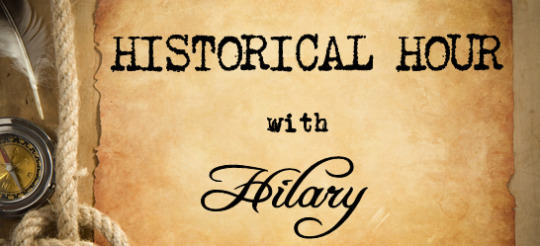
As ever, catch up with earlier installments here, but if you’re ready to rock and roll and head straight to the cheery subject of Nazi Germany in 1944, carry on. This week, we really see what this crazy job is costing our team, and are invited to think very carefully about some of our usual clear-cut distinctions between good and evil, in “Party at Castle Varlar.”
Count me impressed (as I am with most things this show does) that for the inevitable World War II episode, they focused on such an unknown event, and then went for the jugular of explicitly pointing out the overwhelming involvement of Nazi rocket scientists in America’s fledgling space program. We’ll get to that part later, but first, the “Party at Castle Varlar” on 9 December 1944 was a real event, and Wernher von Braun was indeed one of the chief honorees. It is not something that would be known to the casual WWII fan, and its history is somewhat obscure. The location, Schloss Varlar or Castle Varlar in Rosendahl, North Rhine-Westphalia, Germany, was originally a monastery dating from the 11th century, and German Wikipedia tactfully does not mention its stint as Nazi celebration central in the winter of 1944, nor does the local history of the property and grounds. One can understand the desire not to be associated with a party that actually did involve firing off murder rockets, drinking and decorating Nazis with fancy ribbons, firing off more murder rockets, and lots and lots of swastikas, but it does make it hard to chase down extensive details.
The main purpose of the Castle Varlar party, however, was to celebrate the V2 rocket, the invention that Hitler had pinned his hopes to as a game-changing superweapon in the waning days of WWII. Like everything the Nazis did, it was fueled by horrible human rights abuses, concentration camps, and the indiscriminate death of enslaved laborers at its assembly complex in Mittelbau; each functional rocket cost about six human lives, and over 15,000 prisoners would die between 1943-1945; the SS killed another 11,000 trying to clear the camps before the Americans arrived. This is far more than the V2 itself ever actually killed, and to say the least, it did not win the war for Hitler. It also led to the post-war removal of over 1,500 Nazi scientists by the U.S. Joint Intelligence Objectives Agency, especially those who had worked on rocket technology, to be tried for war crimes -- nope, to be invited to America, with full new false identities and strategic cover-ups of their pasts, and made part of the American space program. It was codenamed Operation Paperclip. There’s a 41-page list of them if you want to look, and as Annie Jacobsen points out, “These were not nominal Nazis.” Almost half of the top-ranking twenty-one scientists had worked directly with Hitler, Himmler, or Goring during WWII, including von Braun. As the Time Team has to reckon with, America’s success in the Space Race was a direct result of the importation of Nazi rocket scientists. And yep, it was hella covered up and lied about by the U.S. government, and justified as keeping the Nazis away from the Soviets. (Yeah, considering the German-Russian experience in WWII, I’m guessing the Nazis were really eager to go work for Stalin.) Oh yeah, Britain got in on the action as well.
We can clearly see this attitude in a 1995 memo reviewing Operation Paperclip, in which we are reminded that the State Department was urged to, you know, completely forget that these guys were Nazis in the name of National Security Against The Commies:
The possibility of scientists being won to the Soviet side in the Cold War was, according to Captain Wev, the highest consideration. In a March 1948 letter to the State Department, Wev assessed the prevailing view in the government: "[R]esponsible officials ... have expressed opinions to the effect that, in so far as German scientists are concerned, Nazism no longer should be a serious consideration from a viewpoint of national security when the far greater threat of Communism is now jeopardizing the entire world. I strongly concur in this opinion and consider it a most sound and practical view, which must certainly be taken if we are to face the situation confronting us with even an iota of realism. To continue to treat Nazi affiliations as significant considerations has been aptly phrased as `beating a dead Nazi horse.'"
Say it with me, kids: Everything is terrible. Love nothing.
(Did you really expect an essay about the Nazis to be cheery?)
Von Braun went on to a glittering career in America, including directly influencing Walt Disney’s 1950s fascination with space exploration, and being responsible for the building of the Saturn V rocket at the Marshall Space Flight Center. Just to reiterate: He was at the Castle Varlar party to be decorated for his achievements with the V2, which had achieved its biggest single success three days before, on 6 December 1944, when a strike killed 561 people in a theater in Antwerp, Belgium. Overall, the V2 killed about 9,000 people over several months; the Allied bombing campaign against Hamburg, Germany in 1943 -- “Operation Gomorrah” -- killed 42,600 German civilians in a week. You can read more about von Braun’s long and unsettling career, relationship with Hitler, and so forth here. Maybe take a cute kitten or two.
Meanwhile, the Time Team meets up with the real-life James Bond, to Wyatt’s fanboy delight: Ian Fleming. This is a bit of a stretch on Timeless’ part. While Fleming’s special intelligence division, No. 30 Commando or 30 Assault Unit, was involved in operations against German scientists in the winter of 1944, Fleming himself was off on recon missions in the Far East, and usually did not participate in frontline operations anyway. However, it’s more fun to meet Fleming rather than a guy who happened to work for him, and Wyatt is certainly not complaining. (By coincidence, Ian Fleming has a niece named Lucy, who is now in charge, along with her sister, of her late uncle’s estate.)
And now, if you haven’t had enough of them, a final word about the Nazis:
In episodes like this, in the endless WWII dramas, books, TV series, films, games, and other entertainment, in every kind of popular entertainment where the Nazis have become the stock villain, where we have become desensitized to them by their ubiquitous presence, it is incredibly easy to forget how evil these people were, and that America was being encouraged/was willing to do so as soon as WWII was over. Yes, every argument on the internet will involve someone invoking Hitler at some point, but a “Nazi” is not just anyone you dislike or who has a strong opinion on grammar, but someone who was, and is, part of a specific, pervasive, and unspeakably evil political ideology that is once more increasingly accepted and celebrated today. If you find someone trying to distance what they believe from the concrete label of “Nazism,” then yes, they may be technically correct that they were not a National Socialist in Germany between 1933-1945, but Grandma Hilary asks, rather begs you, to lower your glasses, squint very hard at this person, and ask why they’re cool with everything about this political ideology except the name. Is it because they know Nazis Are Bad (which used to be the most uncontroversial statement in history and now has become subject to Discourse (tm) in the name of Giving Everything A Fair Chance) But We Aren’t Them?
Repeat after me: There is no moral equivalency between Nazism and strenuously opposing Nazism by every means available. You are not “just as bad as them” if you have a zero tolerance line on this. Nazism is not fun, Nazism is not cool, Nazism is not something to be excused or downplayed or rhetorically hedged about or selectively borrowed from, Nazism is not just “harmless white pride,” Nazism is not unique to Germany under Hitler, and Nazism is not just something that Indiana Jones villains are. This should not even be a debate. This should not be the ghost of a question.
Got it? Good.
Next week: Remember the Alamo? Well, maybe.
57 notes
·
View notes
Text
Early days with Baba
I had been a spiritual seeker and earnestly looking for any way I could "heal" for several years. Going from vipassana meditation to native American shamanic practices, I stripped away all I could that bound me to any falsehood. And for those years I found much help in those practices and experiences but always felt something was missing.
In the summer of 2016 I met Adrienne, and the first thing I noticed stepping in her apartment in Oakland were pictures of Meher Baba in almost every room. She had showed me a photo of Him in the car the first time we met and I instantly knew He was a Master. To what extent, I didn't know at the time, but I stared into His eyes for what seemed like 30 mins.
It felt like peering into the eyes of an old friend as His smile brought one to mine. It was a tranquil experience but to be honest I didn't think much of it because I had spent time before looking at pictures of Saints from India and experienced similar feelings.
In the next year of Adrienne and I dating I would be doing my daily tasks and see Baba's image constantly...and this got me to wonder...who is this Meher Baba really? In all the studies I'd done on Indian Saints and Gurus I had never come across His name, or image once! Was He a fraud and my girlfriend an unfortunate pawn? I needed to know.
I kept looking at His photos and read Wikipedia but couldn't find a scandal or bad rep to His Name. This intrigued me more.
So I began to dig through Adrienne’s bookshelf and came upon Discourses Volume II.
As I began to read, I felt an unshakeable pull and the experience of an energetic "download" occurring instantly. I KNEW His words were the Truth and I couldn't find anything I disagreed with on any page I scrolled through. It was a book that was crafted by a genius of the Spirit and I knew there was something for me to learn.
All this while, an indian Master named Neem Karoli Baba had been in my life for several years. I had had a spiritual awakening listening to Ram Dass in my early 20’s and felt my Heart awaken meditating on pictures of Neem Karoli Baba. Many a great feverish moment of utmost pain and suffering had I dropped down to my face on the floor in prostration begging for mercy and help.
As the days and weeks went on, I read more and more of the Discourses and plunged into the material. I thought, “Well if this Meher Baba said these things He must have some truth to Him. I still don’t know what my relationship to Him is though.” I was not however, consciously seeking Meher Baba as a guide or Master. I was simply interested in the Discourses and appreciated the spiritual topics discussed. One day my girlfriend (Adrienne) got invited to play music at a Baba event in upper New York called the Northeast Gathering and invited me to come. I hesitantly agreed. I wasn’t sure about being around a bunch of “Baba lovers” when I only was just beginning to read His material.

After a long drive with a wonderful man named Pauli from landing in New York, we arrived in a community center near Yonkers surrounded by lush green hills and trees. People greeted us warmly but I felt a little distant until one man named Charles Haynes approached me with the warmest of smiles. I was in line in the dining hall picking out slices of bread from a table covered in condiments.
“Hello there, I was told that you are Adrienne’s partner. Wonderful to meet you, my name is Charles, Charles Haynes”. I shook his outstretched hand. It was cool to the touch, and I felt a soothing energy and smiled back.
“Nice to meet you. My name’s Alan. This is my first time at a Baba meeting.”
His sharp blue eyes eased my tension. He seemed unexplainably familiar.
“Oh that’s wonderful. Well we’re glad you both made it! Would you like to sit together for lunch?” His attire looked sharp, as if he was going to a business meeting.
“Sure, I think Adrienne is already seated over there.”
We walked over to the long table covered in red and white checkered tablecloth. I wanted to sit there because it was in the right side of the room and closer to the tall windows outlooking the green trees and fields beyond. Charles had met Adrienne before so they caught up. I was dipping my bacon in a sunny-side-up egg when suddenly a question popped up in my head. When there was finally a pause in their conversation I said, “ Hey Charles, may I ask you a question about your opinion on God?”
His quiet smile made a sudden shift in the energy at the table, and the chatter from the others at the table lulled to a halt.
“Why, yes of course Alan. Ask away.”
I swallowed my bite of bacon and said, “ So I have a sense that God is beyond comprehension, being everything, everywhere all at once. It seems hard for me to accept or understand how God could be one person, or embodied in a human, since God to me is literally every atom and molecule from earth to the farthest reaches of space. I don’t know if I can see God in one person, since many people have claimed themselves as God in human form before.”
Charles seemed to watch each word I said like he was reading a puzzle, nodding and pausing for a few seconds before he responded.
“Hmm. I think I understand the question implied. Yes, I very much agree that God is everything and everywhere.” His southern twang accented his words, “And it seems to me that in the case of Meher Baba, He is one of the faces of God in human form. But it’s a personal relationship, one that is between you and Him. Some people have such a connection while some do not. Meher Baba loves all indiscriminately.”
His words simmered in my head as the day went on. There was something about the love in Charles’s eyes when he spoke of Baba, something about his deep connection with a man I had never met that was deeply palpable. I pondered on this until the evening when Charles was a guest speaker in the main Hall. There were about 50 people gathered for the talk in the low ceiling-room, most in their mid-50s to 70s. Adrienne and I sat in the front row and I didn’t expect to hear much except a few stories of how Charles met Meher Baba in the 1950’s. What happened next not only changed the entire course of my life, but opened the door of my heart to a pool of unconditional love that continues to sustain me on a daily basis.
Charles got to a place in the story where Baba was visiting His Center in Myrtle Beach South Carolina in 1958. At 8 years old Charles lived on the Center and in this particular moment, Baba was walking past him and did not acknowledge Charles in a way that stirred him up greatly. (Please see this link to Charles telling the story, my explanation here does not give it justice! https://www.youtube.com/watch?v=z_LH4q0FyI8 at the 30:00 min mark on)
Suddenly in a flash of instinct Charles reached out, and took hold of Baba’s sadra (clothing). He mentioned that it was totally out of his character to act in such a manner but found his heart had impelled him to reach out and hold on to Baba. He felt so much love for Baba, not because of any particular reason, but because it was spontaneous and erupted from his very soul. At this point in the story I was sitting very still and listening very intently. The whole room was dead silent and the rhythm of Charles’s voice brought up within me first a warmth in my chest, then what felt like fire and an eruption of emotion that leapt out of my soul. I began to weep so fiercely that it took me by complete surprise. And not only that, but Adrienne had also burst into tears right at the very same moment. It was a force of love I had longed for my whole life, a feeling of complete acceptance and forgiveness, like being cradled in the Cosmic arms of Infinity.

Charles Haynes in Myrtle Beach 1958. The exact moment he leapt for Baba.
I would experience in the coming weeks and months a powerful remembering; a deep-seated feeling of coming back home to myself through the love for Meher Baba in a series of dreams, visions, meditations, and synchronicities. This familiarity with a man I had not met in this lifetime was perplexing, but brought absolute significance to my life. As Baba states in Discourses Volume II, page 94:
“The relation between the Master and the disciple is often carried on from one life to another for several reincarnations. Those who have been connected to the Master in past lives are drawn to him by an unconscious magnetism, not knowing why they are thus drawn. There is usually a long history to the apparently unaccountable devotion which the disciple feels for his Master. The disciple is often beginning where he had left off in the last incarnation.”
One night a little while after our trip to NY, I had a dream I was walking through a vast desert with sand as far as the eye could see. I saw a black scorpion and some brush. Suddenly I began to be pulled backward, up and into the top of a closet shelf then into a dimly lit room sitting in a chair. The sun was out but the cream colored blinds were closed. The interior looked retro, from the 1960’s.
A man was sitting in a chair opposite to me near the window looking toward a bed to my right. He was describing what seemed to be his worries and troubles. Suddenly in the middle of his sentence as he was saying the word “sadness” another voice, a voice more clear than I’ve ever heard, thunderously said "SADNESS". A finger pointed at the man and when I followed the tip of the finger to the face, lo and behold it was Meher Baba. As he sat on the bed he looked down at me directly making eye contact. He did not blink as he looked deeply into me, and my whole body began to quiver. It came as a shock because there I was, suspended in the crackling intensity of Truth, breathless, soundless, just vividly awake. I was looking into the eyes of the timeless, eternal One and he looked as real as anyone in “waking” reality. I’m not sure how long I looked into His eyes, but at one point I began to weep into my hands profusely. I kept repeating over and over "I thought Neem Karoli Baba was my Master". I woke from the dream in fervent tears breathing heavily with my heart racing.
During these early months of Baba slowly but surely hooking me to His Damaan, I was battling my confusion with why Neem Karoli Baba had been in my life and who he was to me now. It wasn’t till one night while staring at Neem Karoli Baba’s photo that the answer came. I had the experience of him telling me, “I have brought you to the Ocean of Love”. I began weeping not knowing what that meant for I hadn’t known that phrase to be connected to Meher Baba. I just felt an indescribable sensation that the “train tracks” were being shifted from one frequency to another.
With tears still streaming down my face I walked into the living room where Adrienne was on her computer. I went over and saw on the screen a quote from Meher Baba that read in big letters, “I AM THE OCEAN OF LOVE”. And that was it. I fell to my knees and it felt like galaxies and starlight imploded in my chest. Baba felt so physically near and I held my heart sobbing hot tears to the ground, for He was the One I knew to be my true Master.
I eventually found a passage in Discourses Volume II Pgs. 54-55, that discussed the experience of having multiple Masters in one lifetime:
“All Perfect Masters are one in their consciousness and it is absurd to imagine any grades between them. Though one Master is not greater than the other, the disciple must, for his own purposes, place the claim of his own Master over and above the claims of other Masters until he transcends the domain of duality and realizes the unity of all life…in very rare cases, owing to special circumstances, the Masters themselves might decide to share the spiritual work in relation to a particular disciple. There are, therefore, exceptional cases of disciples who have had to affiliate to two or more Masters. This is an exception rather than the rule, and where there are more Masters than one, they arrange the distribution of their work so carefully that they do not set up any conflict of claims.”

After that day I never reached out internally or externally to Neem Karoli. I didn’t think about it or question, it was just time to move forward with the God Man, that’s all.
0 notes
Text
Extraordinary Popular Delusions and the Madness of Crowds
There must be something of the nineteenth century in my character, given the number of nineteenth-century-books on my list of books that I’d say materially altered the way I think about the world. Some titles, you could probably guess on your own: Moby Dick, Huckleberry Finn, The Scarlet Letter, Leaves of Grass, and Tolstoy’s Resurrection are all there, although possibly not in the order you’d have predicted. But those are all works of fiction—fiction at its most sublime, yes, but fiction nonetheless—and there are non-fiction books on my list as well and among them is the book I wish to write specifically about today, Charles Mackay’s Extraordinary Popular Delusions and the Madness of Crowds.
It’s a remarkable book, even 176 years after it was first published in 1841. And it had a profound effect on me, one that altered my thinking in every way, even theologically, by bringing me to the realization that truths can elude almost everybody, that things that everybody “just” knows can just as likely be false as true, and that falsehoods can easily masquerade not merely as true statements but almost as societal axioms—that is, as the kind of “common knowledge” facts that people are made to feel foolish even to question, let alone to deny. It’s a big book (almost 700 pages in the edition I own), but it’s well worth the effort and the time necessary to read—indeed, almost every chapter is eye-opening and interesting. Mackay was a Scot who spent most of his working life in Belgium and England, where he worked as a lawyer without ever losing his predilection for writing. He was apparently the first to compile a dictionary of the language then called “Lowland Scotch,” the dialect of Gaelic spoken in the Scotland in his day. And he wrote Extraordinary Popular Delusions and the Madness of Crowds, his masterpiece.
One by one, the author goes through beliefs that were either current in his own day or in some earlier time and shows how they achieved nearly universal credence despite the fact that there was no convincing evidence—and often no evidence of any sort at all—to support them. Let me quote the opening passage from the preface to the 1852 edition:
In reading the history of nations, we find that, like individuals, they have their whims and their peculiarities; their seasons of excitement and recklessness, when they care not what they do. We find that whole communities suddenly fix their minds upon one object, and go mad in its pursuit; that millions of people become simultaneously impressed with one delusion, and run after it, till their attention is caught by some new folly more captivating than the first.
And then he goes on to demonstrate that, to cite his own words, “men…go mad in herds, while they only recover their senses slowly, and one by one."
Mackay and his book have repeatedly come to my mind as I have been contemplating the nation-wise brouhaha concerning the President’s Executive Order barring refugees from everywhere but Syria from entering our country for the next 120 days, refugees from Syria from entering indefinitely, and immigrants from seven predominantly Muslim countries from entering for the next ninety days. It may seem odd to reach back to a book written almost two centuries ago for insight regarding events happening now, but I have to say that I can’t recall ever hearing more people say more things that they somehow “just” know to be the truth without bothering to say how exactly they know themselves to be right, let alone unarguably true. And the more such “facts” are bandied about as though they were not groundless assertions but self-evident truths, the more I regret that Mackay isn’t around to prepare a twenty-first century edition of his book.
The President’s ban has maddened people because it was apparently promulgated without being formally vetted in advance by officials at the Justice Department or the Department of Homeland Security. I’m hardly an expert on these things, but that feels like a huge misstep: the people responsible for enforcing the President’s directive on the ground should probably have been given maximal, not minimal, time to prepare. But the specific problems connected with enforcing the two bans are not really the issue here…and it is precisely outside the issue of how exactly to enforce the ban that people on both sides seem to be campaigning for a place in an updated edition of Mackay’s book.
For people who support the Executive Order, the challenge seems clear. We are surely all in agreement that our government should not admit terrorists or criminals to our country merely because they present themselves as peaceful immigrants or refugees. And so, that being the case, the only convincing argument in favor of a ban on entering our country on the scale of the President’s Executive Order would logically have to be that the system to vet would-be refugees and immigrants that we already have in place is not working properly and that, time and time again, those charged with keeping our nation safe have failed to recognize dangerous, or potentially dangerous, people for what they are and so have naively and ineptly admitted them. That argument sounds persuasive, but it needs to be grounded in reality. Where is the list of those bad people we inadvertently let move here? Where is the list of terrorist acts, ones actually carried out or thwarted by law enforcement officials before they could be carried out, that people whom we incompetently let cross the border into our country either did manage to pull off or else clearly intended to pull off? If we have been screening people applying to enter our country ineffectually and inexpertly, where is the proof of that incompetence on the part of the very people being paid to keep us safe—proof that could only really be constituted by a long or even short list of bad people who somehow slipped through despite their best efforts to prevent such people from doing so. But there is no such list…or at least there has not been published any such list that I have seen.
That being the case, all those people insisting that the system is broken need to be asked a simple, pointed question: if the system is letting terrorists and criminals slip into our country, why can’t you list some of their names as proof positive of your assertion? And if the system isn’t actually broken, why do we need to fix it?
But the people on the other side of the aisle have their own unanswered questions to address…because so many assertions coming from the “opposed” camp also seem unsubstantiated and naïve. The President’s Executive Order is not a ban on Muslims per se, which fact is more than adequately demonstrated by the fact that there are dozens of Muslim nations not on the list and whose Muslim citizens are, therefore, not affected at all. Nor are non-Muslim citizens of the countries that are on the list free to enter our country: there was a story carried by the Jewish Telegraphic Agency just the other day about Jews from Iran and Yemen whose visas were cancelled before the Executive Order was put on hold by the courts. So it’s hardly true that the President has banned Muslims from entering our country…and yet I have heard and read people say exactly that now for days and days as though it were a self-evident truth.
Moving along, the assertion that we don’t have anything to fear from radicalized Muslims seems, to say the least, naïve. Perusing the Wikipedia page on “Islamic terrorism” (click here), it’s more shocking how many of these incidents—instances of barbarism that have led to thousands of deaths even just in the last twenty years—have been almost totally forgotten or are at least not regularly referenced in public discourse or in the press. So when people say that the President is behaving irrationally by worrying about the special security issues related to the admission of Muslim refugees or immigrants to our country, that seems, to say the very least, a bit naïve. The key, I think, is to avoid careening away from thoughtful caution and intelligent watchfulness towards xenophobia and the kind of blanket condemnation that makes it harder, not at all easier, to identify the bad guys: all Muslims are surely not terrorists, but there are large, well-funded groups of radical Islamicists out there who express themselves through violence and terrorism…and the foundation of whose worldview is precisely their particular version of Islam. Particularly bizarre, I should add, is hearing Jewish people who claim to feel a deep sense of allegiance with Israel—including, I am ashamed to say, some rabbis—who appear to feel called upon for some obscure reason not to take note of the phenomenon of radical Islamicist terrorism in the world and, just to the contrary, to brand as racist anyone who does. These people too deserve a chapter in Mackay’s book.
Our world would be a lot easier to negotiate if the prerequisite for being quoted in the press or appearing on television was that you had to read Mackay’s book and internalize its lessons. The basic facts in evidence are not only clear, but more or less universally agreed upon. All Muslims are not terrorists, and people who claim otherwise are simply wrong. There being versions of Islam that do promote the concept of worldwide jihad and for whom terrorism directed against innocents is fully acceptable, however, we need to guarantee that no Muslims admitted to our country are future terrorists because they do subscribe to the version of Islam that animates ISIS, Al-Qaeda, Hezbollah, Hamas, Al-Shabaab, the Jemaah Islamiyah, Islamic Jihad, and the like…and people who do not see the cogency of that obligation really do belong in Mackay’s book as well. If the system we have in place to vet people from other lands who seek to enter our land to visit or to settle is not working, it needs to be fixed. But the burden of proof in that regard would normally have to rest with the people making that assertion…and just asserting it without being able to present any evidence to bolster such claim is also worth a mention in the next edition of Mackay.
It makes no sense at all to talk about excessive diligence in keeping our country safe and our co-citizens secure—if we were talking about keeping your children safe, would you recognize a level of “excessive” diligence? On the other hand, a former president of our congregation, a physician (and we’ve had several), once pointed out to me that doctors can cure any disease if it’s not considered crucial that the patient survive the curative procedure, but that this is generally not considered the very best way to practice medicine…even despite the 100% cure rate.
2 notes
·
View notes
Text
A Beginners Guild to the Middle East – A Reading List
I’ve worked in DC in Middle Eastern studies and study it in school. Whether it is the news or conversations at the dinner table, it endlessly frustrates me that people don’t even know basic information about the area and deem themselves. I have heard too many time that “oh the Israeli’s and Palestinians? They have been fighting for centuries and we just got to let them” or some shit like that. (No, they haven’t. Wikipedia could tell you this) I get it. Trying to understand the Modern Middle East is difficult. Our American systems have failed us on giving us a well-rounded view on the world.
Trying to understand it through the media and hearsay is like trying to understand the intricacy of the Game of Throne books by watching YouTube clips and reading Fanfiction.
So if y’all are interested, I have some recommended books for y’all. I can verify they are an excellent start to studying the region.
Disclaimer: This is by no means a complete list, nor are they perfect books. But it is good to get started with.
1. The Middle East by Ellen Lust
Why should even care about the 22 countries and how they are different? Well, because the truth is the Middle East isn’t just Israel, Iran, Egypt, and Turkey. Those countries actually tend to be the exceptions to the rules. So pick this up for some very valuable information, and you’ll be surprised to learn how similar and different the Middle East is (or even what that word means). This book is the best place to start. It gives a detailed overview of every single Middle Eastern country and it has a lot of valuable information.
2. James Gelvin – The Modern Middle East
Great history book and gives a good overview. Then its best to jump into specific issues.
3. Orientalism – Edward Said
“Orientalism: the representation of Asia, especially the Middle East, in a stereotyped way that is regarded as embodying a colonialist attitude”
This is a staple of Middle Eastern studies. Said is a little wordy, but he addresses some very important points that is important for Western audiences.
4. Excellent Daughters – Katherine Zopef
This book just came out, and I loved it. It is on women, an often poorly covered issue that either pretends women are only oppressed and have no original thought or focuses too much on Islamic feminism. It gives stories to a world that we sometimes only think of in bombings, and has this great human touch to it. Highly recommend.
5. The ISIS Apocalypse – William Mccants
Yes, the hot topic of this day. This is the most difficult book to chose, because there is so much shit because everyone wants his or her say on ISIS, ISIL, or Daesh (a derogatory term for the group). But frankly, most people have a spin and an agenda that is rather extreme. William McCants is a respected scholar on the Middle East He is a fellow at the Center for Middle East Policy and director of the Project on U.S. Relations with the Islamic World at the Brookings Institution. This should be your go to book on the topic.
6. The Middle East –Bernard Lewis
So Bernard Lewis was one of the first guys ever to write on the Middle East. Overall, he is a descent scholar, but a product of his time (a product of his time meaning colonialism), but his book is interesting and gives a history from ancient to modern times.
He and Edward Said (above) dislike each others work. I included both of them because diverse viewpoints are important. If you are interested in their exchange, which can get rather mean sometimes, just google their exchanges. They get rather biting.
7. The Rise and Fall of Arab President’s for Life – Roger Owen
This poor guy wrote a book on how Arab President’s like Gaddafi, Mubarak, and Assad are “President’s for Life”. The thing is, he finished this book in December 2010, a month before the Arab Spring protests. But it still provides an interesting look into these political systems, which are still relevant after the Arab Spring.
8. The Israel-Palestine Conflict – James Gelvin
I hate to focus on Israel/Palestine, but it comes up in American discourse so much, I thought information was needed. Gelvin has two books on this list, and that is for a reason.
9. Israel – Anita Shapira
This is truly one of the most well-written books I have ever read. It is a detailed history of the founding of Israel to present day, and it covers everything from political to social to cultural. Like all books that deal with Israel, it has a bias – it tilts slightly in to Israeli side, but it is slight, and the scholarly work so great, history so on point, that it is well worth the read.
You cannot understand the present without the past, or frankly, without the correct information. There is so much disinformation in the world, with politicians and the news, but good research on the behalf of the individual can cause so much change. So I can tell you: the region is complicated, but wonderful and rewarding.
TLDR; Middle East is confusing and there is too much misinformation out there. Here is some quality lit to help understand it. Feel free to message me with questions/comments/discussion points. I love talking about this stuff.
#middle east#information#america#toffee apple decides to talk#learning is fun#israel#iran#turkey#oman#yemen#bernard lewis#edward said#anita shapira#palestine#syria#women#isis
3 notes
·
View notes